The document discusses system hacking and reverse engineering techniques. It provides an introduction to vulnerabilities and types of vulnerabilities. The document outlines two tracks - the first introduces bugs, crashes, vulnerabilities, exploitation and defense mechanisms. The second track discusses different types of vulnerabilities like buffer overflows, format string bugs, and use-after-free vulnerabilities. It explains the principles and exploitation of stack and heap overflows.
![System Hacking & Reverse Engineering [Introduction to Vulnerability & Type of Vulnerability] documented by h2spice h2spice@gmail.com](https://image.slidesharecdn.com/systemhackreversetutorial-introductiontovulnandtypeofvuln-141121001316-conversion-gate01/75/System-Hacking-Tutorial-1-Introduction-to-Vulnerability-and-Type-of-Vulnerability-1-2048.jpg)
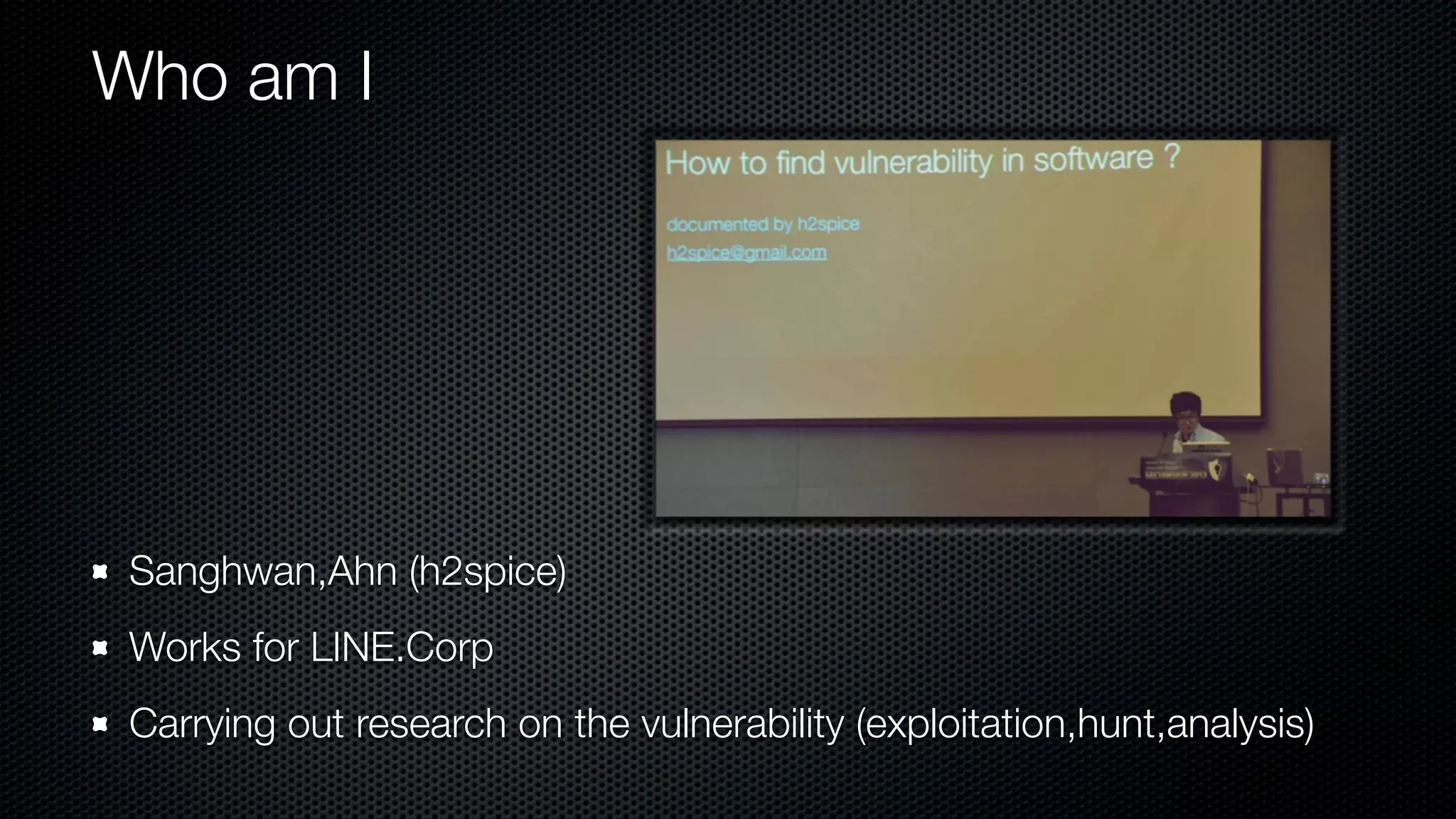
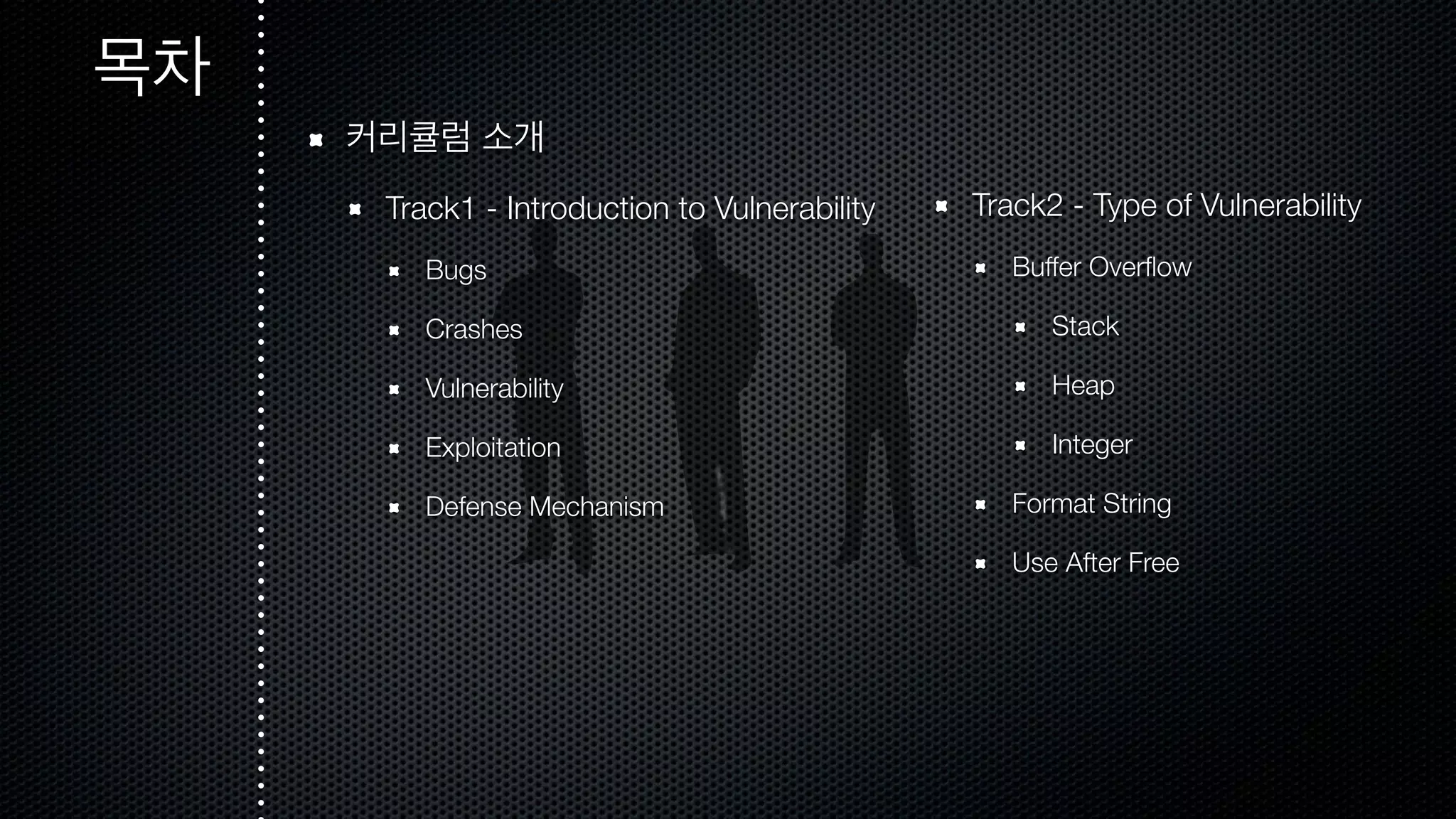
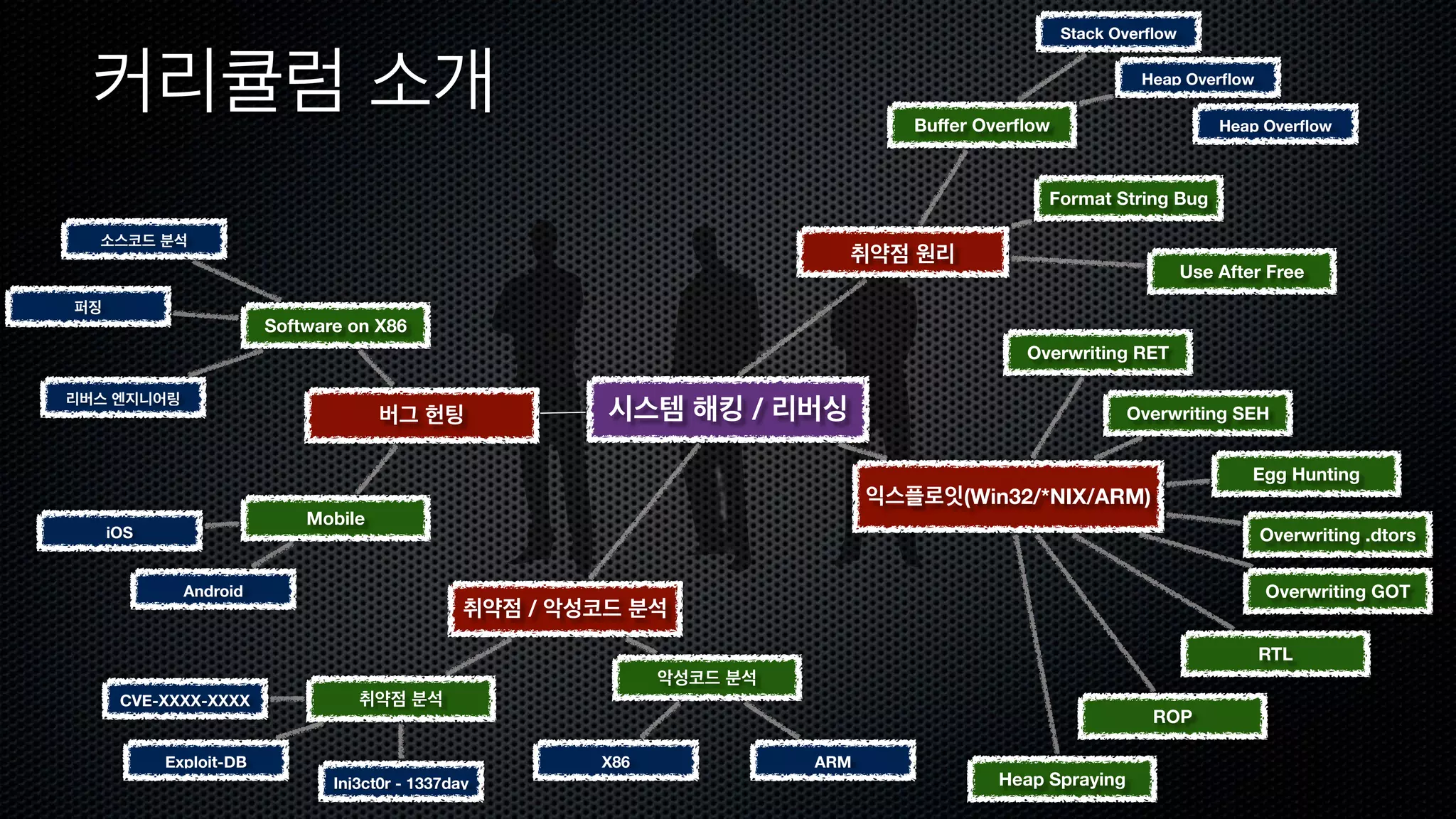


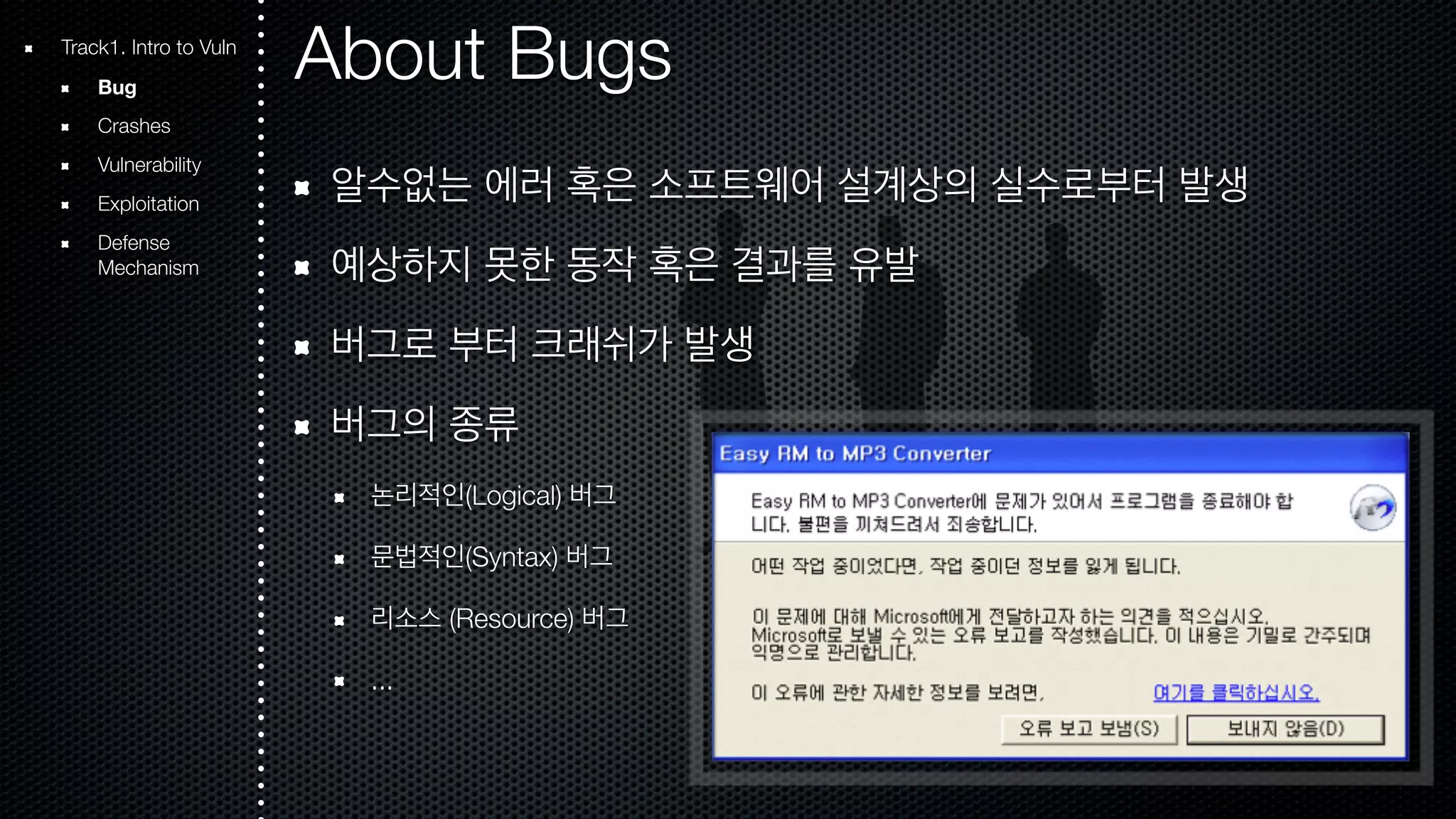
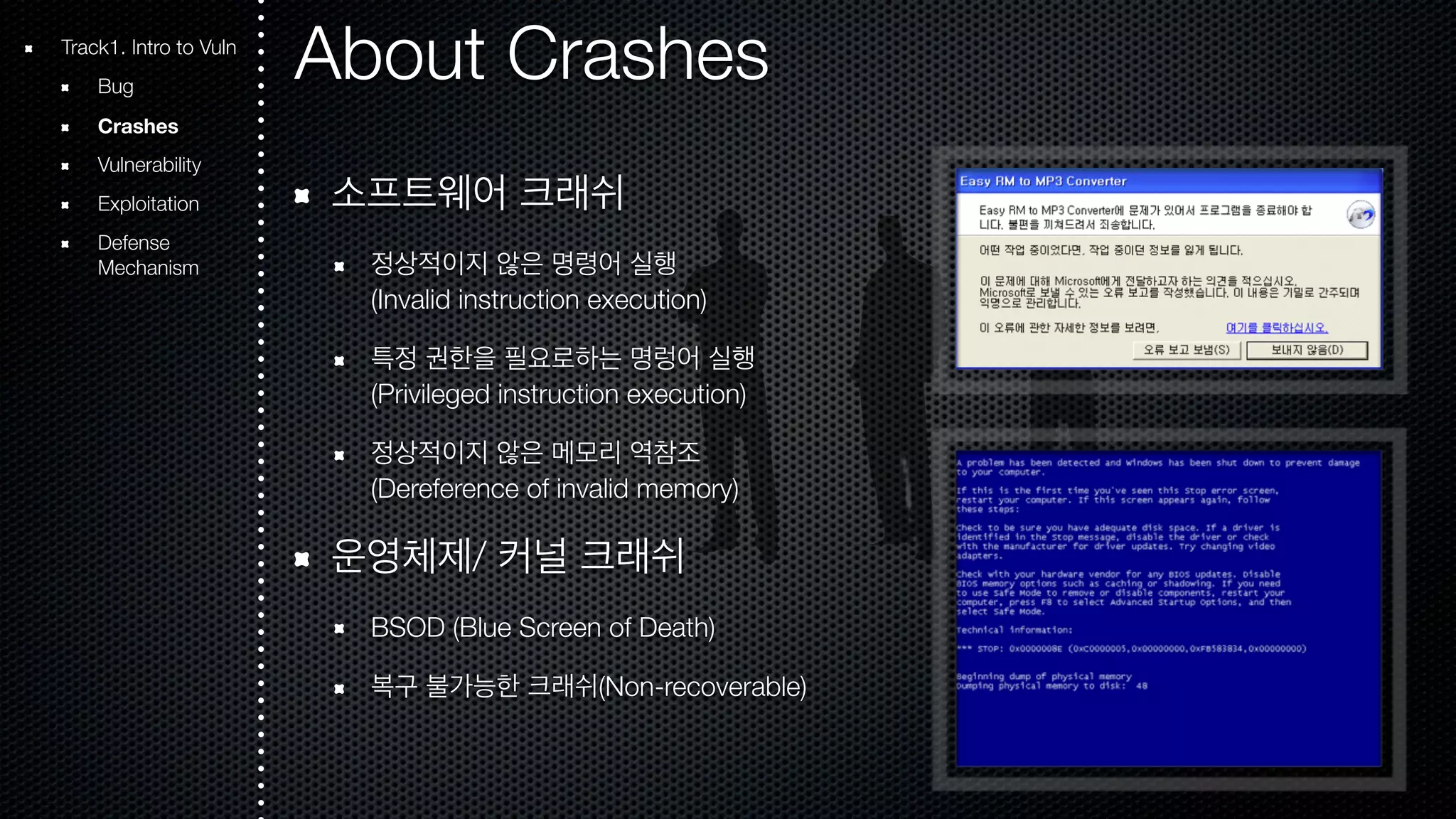
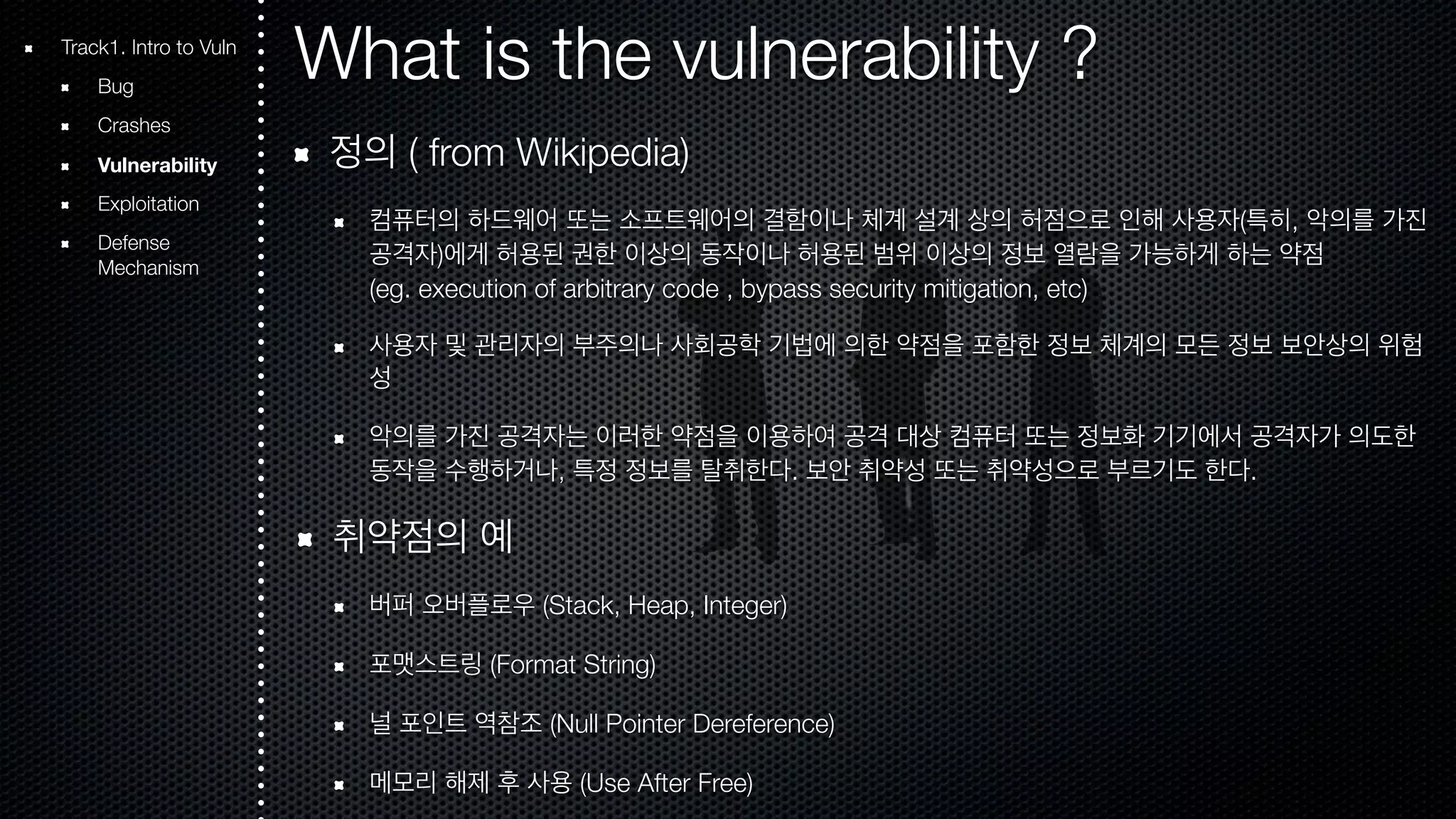
![How many vulnerability disclosure ? 7000 5250 3500 1750 0 7000 5250 3500 1750 0 1988 1990 1992 1994 1996 1998 2000 2002 2004 2006 2008 2010 2012 [ Total Vulnerabilities by Year ] Track1. Intro to Vuln Bug Crashes Vulnerability Exploitation Defense Mechanism](https://image.slidesharecdn.com/systemhackreversetutorial-introductiontovulnandtypeofvuln-141121001316-conversion-gate01/75/System-Hacking-Tutorial-1-Introduction-to-Vulnerability-and-Type-of-Vulnerability-10-2048.jpg)
![How many vulnerability disclosure ? 7000 5250 3500 1750 0 7000 5250 3500 1750 0 1988 1990 1992 1994 1996 1998 2000 2002 2004 2006 2008 2010 2012 [ High Severity Vulnerabilities by Year ] Track1. Intro to Vuln Bug Crashes Vulnerability Exploitation Defense Mechanism](https://image.slidesharecdn.com/systemhackreversetutorial-introductiontovulnandtypeofvuln-141121001316-conversion-gate01/75/System-Hacking-Tutorial-1-Introduction-to-Vulnerability-and-Type-of-Vulnerability-11-2048.jpg)
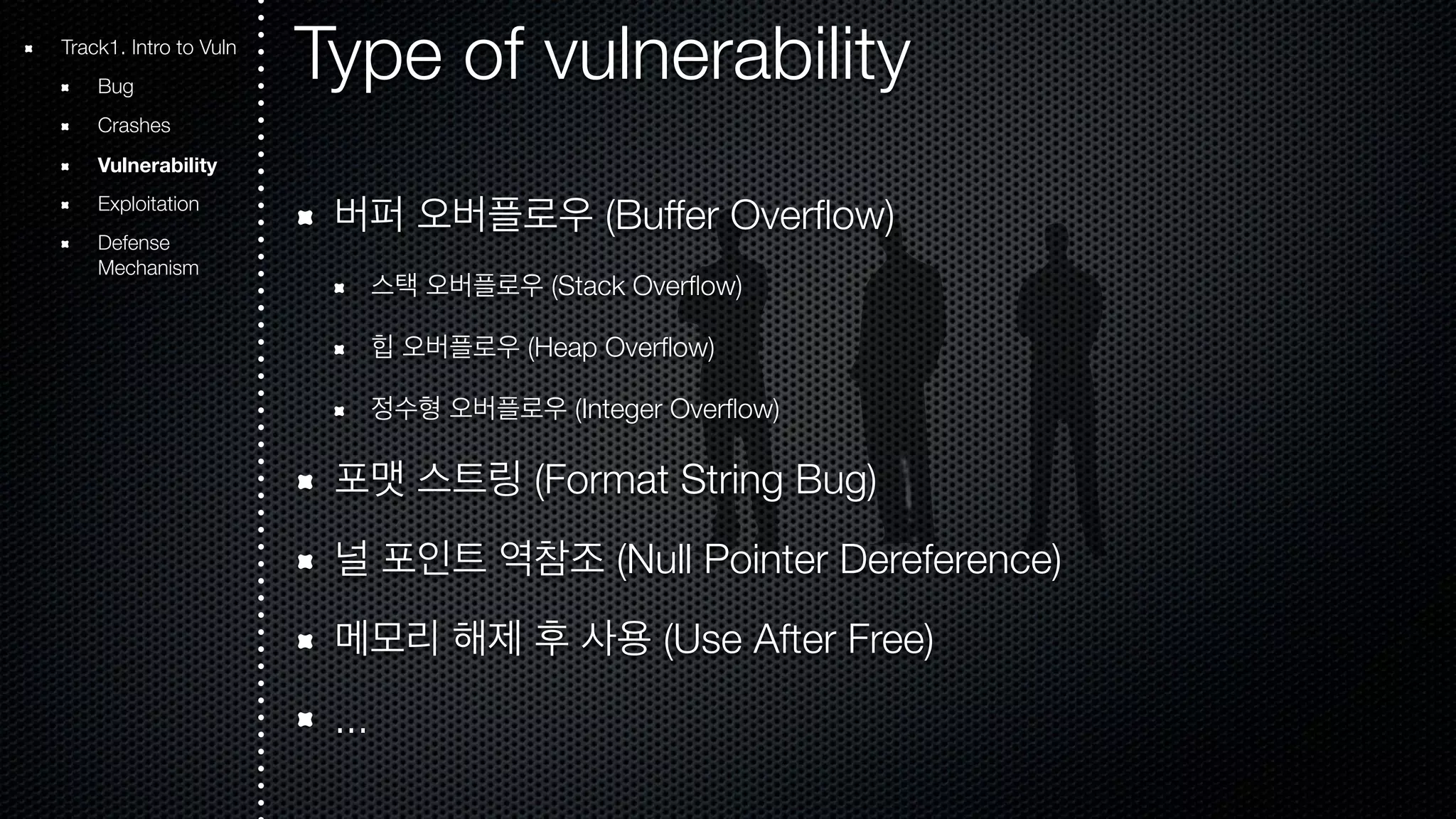
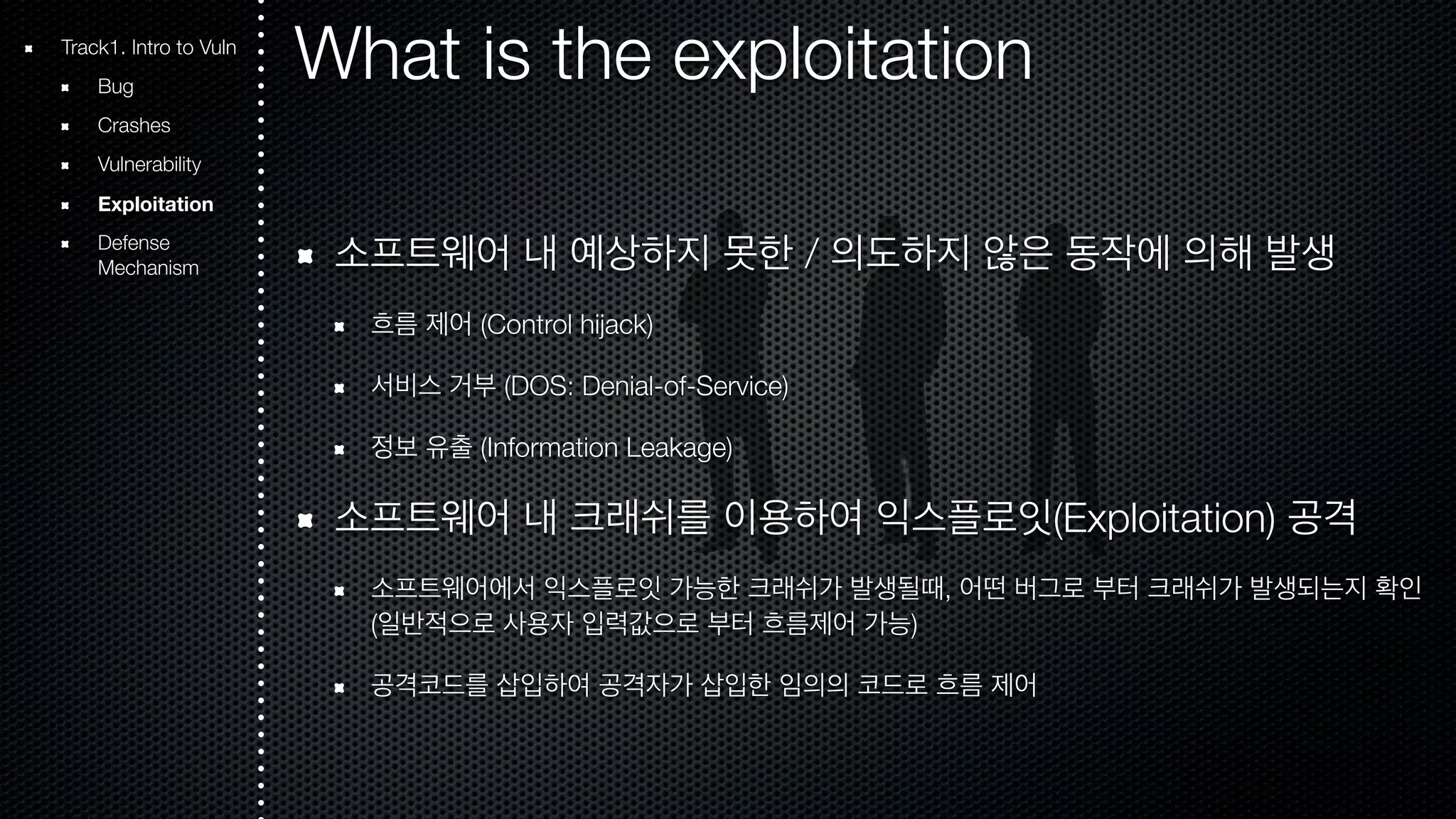
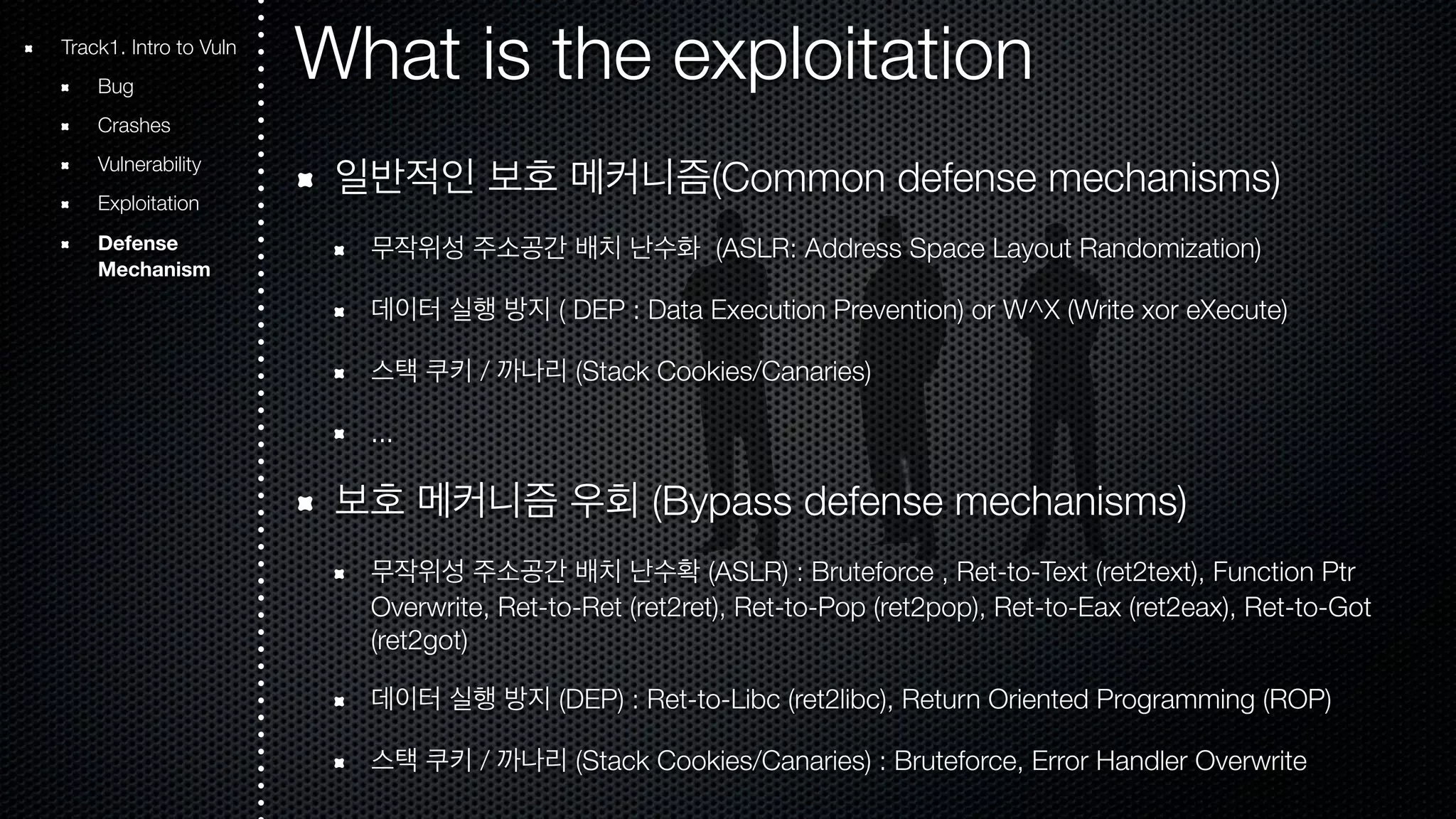


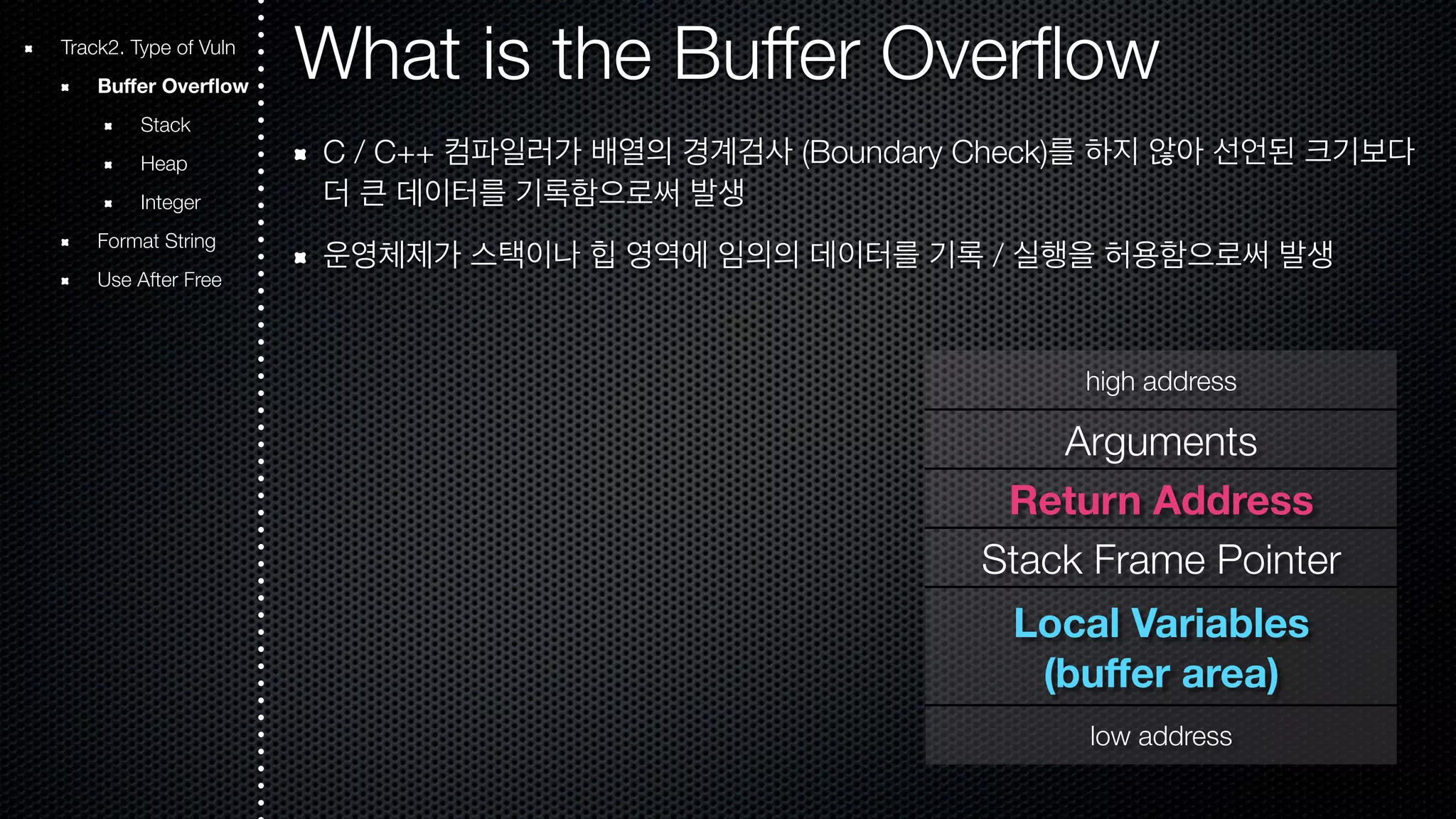
![What is the Stack Overflow 스택 버퍼 오버플로우는 할당된 정적 버퍼의 크기보다 더 많은 데이터가 복사되어질 때 발생합니다. int main(int argc, char* argv[]) { char buf[8]; strcpy(buf,argv[1]); return 0; } Track2. Type of Vuln Buffer Overflow Stack Heap Integer Format String Use After Free](https://image.slidesharecdn.com/systemhackreversetutorial-introductiontovulnandtypeofvuln-141121001316-conversion-gate01/75/System-Hacking-Tutorial-1-Introduction-to-Vulnerability-and-Type-of-Vulnerability-18-2048.jpg)
![Principle of Stack Overflow char buf[8]; strcpy(buf,argv[1]); argv[1] = “AAAAAAA” A A A A A A A 0 argv[1] = “AAAAAAAAAAAA” A A A A A A A A A A A A // 8바이트 버퍼 할당 // 버퍼 오버플로우 발생 X // 버퍼 오버플로우 발생 O Track2. Type of Vuln Buffer Overflow Stack Heap Integer Format String Use After Free](https://image.slidesharecdn.com/systemhackreversetutorial-introductiontovulnandtypeofvuln-141121001316-conversion-gate01/75/System-Hacking-Tutorial-1-Introduction-to-Vulnerability-and-Type-of-Vulnerability-19-2048.jpg)
![Stack Layout Low Address arg2 arg1 &ret (saved eip) saved ebp char buf[8] High Address Calling .Start function: .Start : push %ebp mov %esp, %ebp sub $0xC, %esp ... strcpy(buf,argv[1]); ... leave ret Track2. Type of Vuln Buffer Overflow Stack Heap Integer Format String Use After Free](https://image.slidesharecdn.com/systemhackreversetutorial-introductiontovulnandtypeofvuln-141121001316-conversion-gate01/75/System-Hacking-Tutorial-1-Introduction-to-Vulnerability-and-Type-of-Vulnerability-20-2048.jpg)
![Stack Layout Low Address arg2 arg1 &ret (saved eip) saved ebp char buf[8] High Address Calling .Start function: .Start : push %ebp mov %esp, %ebp sub $0xC, %esp ... strcpy(buf,argv[1]); ... leave ret Track2. Type of Vuln Buffer Overflow Stack Heap Integer Format String Use After Free A A A A](https://image.slidesharecdn.com/systemhackreversetutorial-introductiontovulnandtypeofvuln-141121001316-conversion-gate01/75/System-Hacking-Tutorial-1-Introduction-to-Vulnerability-and-Type-of-Vulnerability-21-2048.jpg)
![Stack Layout Low Address arg2 arg1 &ret (saved eip) saved ebp A A A A char buf[8] High Address Calling .Start function: .Start : push %ebp mov %esp, %ebp sub $0xC, %esp ... strcpy(buf,argv[1]); ... leave ret Track2. Type of Vuln Buffer Overflow Stack Heap Integer Format String Use After Free A A A A](https://image.slidesharecdn.com/systemhackreversetutorial-introductiontovulnandtypeofvuln-141121001316-conversion-gate01/75/System-Hacking-Tutorial-1-Introduction-to-Vulnerability-and-Type-of-Vulnerability-22-2048.jpg)
![Stack Layout Low Address arg2 arg1 &ret (saved eip) saved ebp A A A A A A A A char buf[8] High Address Calling .Start function: .Start : push %ebp mov %esp, %ebp sub $0xC, %esp ... strcpy(buf,argv[1]); ... leave ret Track2. Type of Vuln Buffer Overflow Stack Heap Integer Format String Use After Free A A A A](https://image.slidesharecdn.com/systemhackreversetutorial-introductiontovulnandtypeofvuln-141121001316-conversion-gate01/75/System-Hacking-Tutorial-1-Introduction-to-Vulnerability-and-Type-of-Vulnerability-23-2048.jpg)
![Stack Layout Low Address arg2 arg1 &ret (saved eip) saved ebp A A A A A A A A A A A A char buf[8] High Address Calling .Start function: .Start : push %ebp mov %esp, %ebp sub $0xC, %esp ... strcpy(buf,argv[1]); ... leave ret Track2. Type of Vuln Buffer Overflow Stack Heap Integer Format String Use After Free A A A A](https://image.slidesharecdn.com/systemhackreversetutorial-introductiontovulnandtypeofvuln-141121001316-conversion-gate01/75/System-Hacking-Tutorial-1-Introduction-to-Vulnerability-and-Type-of-Vulnerability-24-2048.jpg)
![What is the Heap Overflow 힙 버퍼 오버플로우는 할당된 동적 버퍼의 크기보다 더 많은 데이터가 복 사되어질 때 발생합니다. int main(int argc, char* argv[]) { char *buf buf = malloc(4); memcpy(buf,argv[1],size); return 0; } Track2. Type of Vuln Buffer Overflow Stack Heap Integer Format String Use After Free](https://image.slidesharecdn.com/systemhackreversetutorial-introductiontovulnandtypeofvuln-141121001316-conversion-gate01/75/System-Hacking-Tutorial-1-Introduction-to-Vulnerability-and-Type-of-Vulnerability-25-2048.jpg)
![Principle of Heap Overflow buf = malloc(4); memcpy(buf,argv[1],sizeof(argv[1])); argv[1] = “AAA” A A A 0 argv[1] = “AAAAAAAAAAAA” A A A A A A A A A A A A // 4바이트 버퍼 할당 // 버퍼 오버플로우 발생 X // 버퍼 오버플로우 발생 O Track2. Type of Vuln Buffer Overflow Stack Heap Integer Format String Use After Free](https://image.slidesharecdn.com/systemhackreversetutorial-introductiontovulnandtypeofvuln-141121001316-conversion-gate01/75/System-Hacking-Tutorial-1-Introduction-to-Vulnerability-and-Type-of-Vulnerability-26-2048.jpg)
![Heap Layout Calling .Start function: .Start : push %ebp mov %esp, %ebp sub $0xC, %esp ... memcpy(buf,argv[1], sizeof(argv[1])); ... leave ret Track2. Type of Vuln Buffer Overflow Stack Heap Integer Format String Use After Free Low Address Prev_size size Data[4] Prev_size size Data[4] High Address Prev_In Use bit Prev_In Use bit](https://image.slidesharecdn.com/systemhackreversetutorial-introductiontovulnandtypeofvuln-141121001316-conversion-gate01/75/System-Hacking-Tutorial-1-Introduction-to-Vulnerability-and-Type-of-Vulnerability-27-2048.jpg)
![Heap Layout Two allocated chunks on the heap Calling .Start function: .Start : push %ebp mov %esp, %ebp sub $0xC, %esp ... memcpy(buf,argv[1], sizeof(argv[1])); ... leave ret Track2. Type of Vuln Buffer Overflow Stack Heap Integer Format String Use After Free Low Address Prev_size size Data[4] Prev_size size Data[4] High Address Prev_In Use bit Prev_In Use bit](https://image.slidesharecdn.com/systemhackreversetutorial-introductiontovulnandtypeofvuln-141121001316-conversion-gate01/75/System-Hacking-Tutorial-1-Introduction-to-Vulnerability-and-Type-of-Vulnerability-28-2048.jpg)
![Heap Layout Two allocated chunks on the heap Calling .Start function: .Start : push %ebp mov %esp, %ebp sub $0xC, %esp ... memcpy(buf,argv[1], sizeof(argv[1])); ... leave ret Track2. Type of Vuln Buffer Overflow Stack Heap Integer Format String Use After Free Low Address Prev_size size Data[4] Prev_size size Data[4] Chunk1 Us0e bit High Address Prev_In Us1e bit Chunk2 Prev_In](https://image.slidesharecdn.com/systemhackreversetutorial-introductiontovulnandtypeofvuln-141121001316-conversion-gate01/75/System-Hacking-Tutorial-1-Introduction-to-Vulnerability-and-Type-of-Vulnerability-29-2048.jpg)
![Heap Layout Two allocated chunks on the heap Calling .Start function: .Start : push %ebp mov %esp, %ebp sub $0xC, %esp ... memcpy(buf,argv[1], sizeof(argv[1])); ... leave ret Track2. Type of Vuln Buffer Overflow Stack Heap Integer Format String Use After Free Low Address Prev_size size Data[4] Prev_size size Data[4] Chunk1 12(0xc) Us0e bit High Address Prev_In Us1e bit Chunk2 Prev_In 12(0xc) 13(0xd)](https://image.slidesharecdn.com/systemhackreversetutorial-introductiontovulnandtypeofvuln-141121001316-conversion-gate01/75/System-Hacking-Tutorial-1-Introduction-to-Vulnerability-and-Type-of-Vulnerability-30-2048.jpg)
![Heap Layout Two chunks, of which the first is free for allocation Calling .Start function: .Start : push %ebp mov %esp, %ebp sub $0xC, %esp ... memcpy(buf,argv[1], sizeof(argv[1])); ... leave ret Track2. Type of Vuln Buffer Overflow Stack Heap Integer Format String Use After Free Low Address Prev_size size unused Chunk FD (pointer to the next free chunk) BK (pointer to the pref free chunk) Unused Prev_size size Data[4] High Address Prev_In Use bit Chunk1 0](https://image.slidesharecdn.com/systemhackreversetutorial-introductiontovulnandtypeofvuln-141121001316-conversion-gate01/75/System-Hacking-Tutorial-1-Introduction-to-Vulnerability-and-Type-of-Vulnerability-31-2048.jpg)
![Heap Layout Two allocated chunks on the heap Calling .Start function: .Start : push %ebp mov %esp, %ebp sub $0xC, %esp ... memcpy(buf,argv[1], sizeof(argv[1])); ... leave ret Track2. Type of Vuln Buffer Overflow Stack Heap Integer Format String Use After Free Low Address Prev_size size Data[4] Prev_size size Data[4] Chunk1 12(0xc) Us0e bit A A A A High Address Prev_In Us1e bit Chunk2 Prev_In 12(0xc) 13(0xd)](https://image.slidesharecdn.com/systemhackreversetutorial-introductiontovulnandtypeofvuln-141121001316-conversion-gate01/75/System-Hacking-Tutorial-1-Introduction-to-Vulnerability-and-Type-of-Vulnerability-32-2048.jpg)
![Heap Layout Two allocated chunks on the heap Calling .Start function: .Start : push %ebp mov %esp, %ebp sub $0xC, %esp ... memcpy(buf,argv[1], sizeof(argv[1])); ... leave ret Track2. Type of Vuln Buffer Overflow Stack Heap Integer Format String Use After Free Low Address Prev_size size Data[4] Prev_size size Data[4] Chunk1 12(0xc) Us0e bit A A A A A A A A High Address Prev_In Us1e bit Chunk2 Prev_In 12(0xc) 13(0xd)](https://image.slidesharecdn.com/systemhackreversetutorial-introductiontovulnandtypeofvuln-141121001316-conversion-gate01/75/System-Hacking-Tutorial-1-Introduction-to-Vulnerability-and-Type-of-Vulnerability-33-2048.jpg)
![Heap Layout Two allocated chunks on the heap Calling .Start function: .Start : push %ebp mov %esp, %ebp sub $0xC, %esp ... memcpy(buf,argv[1], sizeof(argv[1])); ... leave ret Track2. Type of Vuln Buffer Overflow Stack Heap Integer Format String Use After Free Low Address Prev_size size Data[4] Prev_size size Data[4] Chunk1 12(0xc) Us0e bit A A A A A A A A A A A A A A A A High Address Prev_In Us1e bit Chunk2 Prev_In 12(0xc) 13(0xd)](https://image.slidesharecdn.com/systemhackreversetutorial-introductiontovulnandtypeofvuln-141121001316-conversion-gate01/75/System-Hacking-Tutorial-1-Introduction-to-Vulnerability-and-Type-of-Vulnerability-34-2048.jpg)
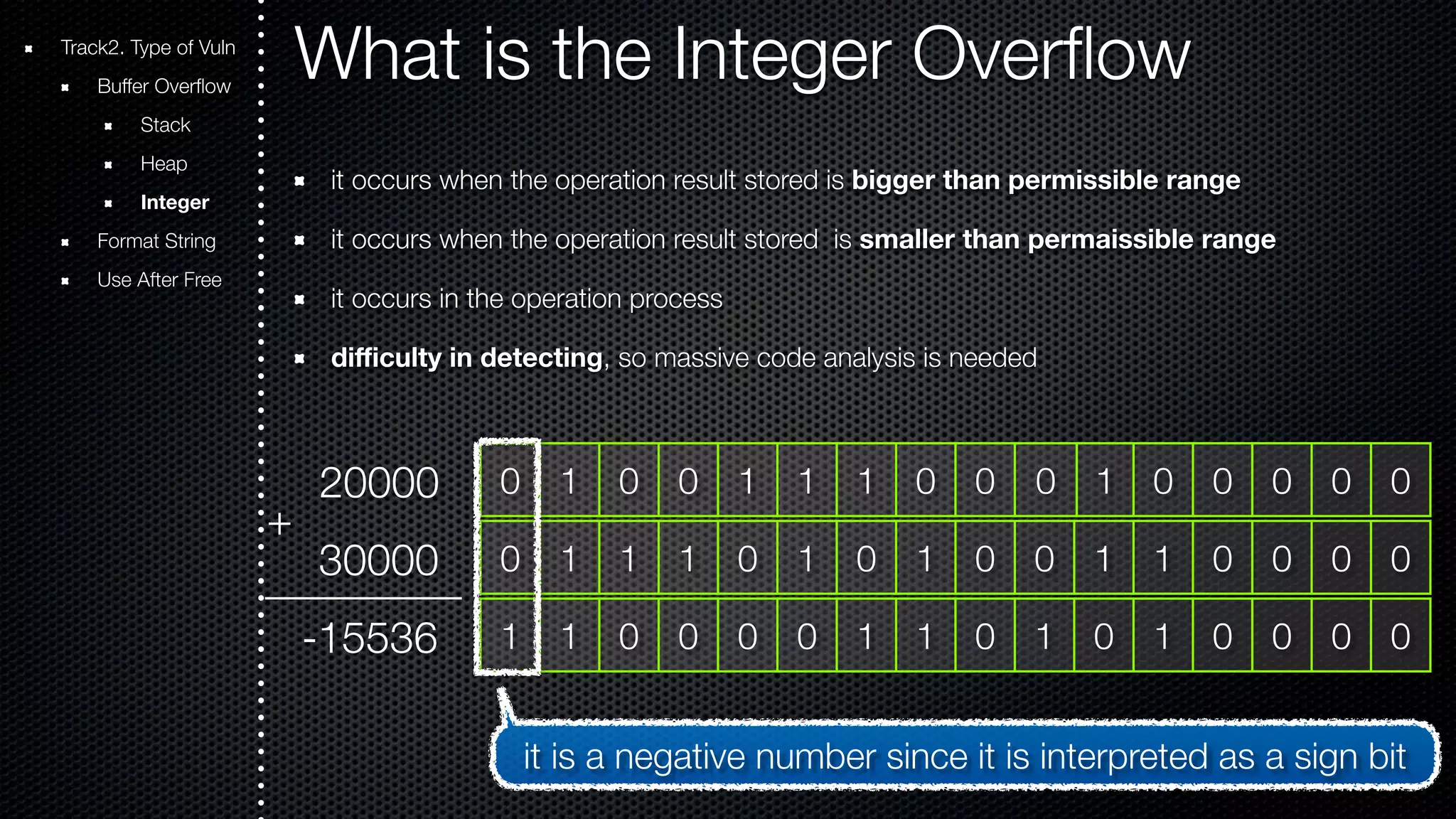
![Example of the Integer Overflow Output 1 - The normal case Output 2 - Integer Overflow #include <stdio.h> #include <string.h> int main(int argc, char* argv[]) { signed int type1=NULL; /*signed type*/ signed int type2=NULL; /*unsigned type*/ unsigned int type3=999999999999999999; /*integer overflow*/ type1 = strlen(argv[1]); if(argv[2]!=NULL) { /*due to some operations*/ type2=type3; } printf("type1 = %d n",type1); printf("type2 = %dn",type2); return 0; } Track2. Type of Vuln Buffer Overflow Stack Heap Integer Format String Use After Free](https://image.slidesharecdn.com/systemhackreversetutorial-introductiontovulnandtypeofvuln-141121001316-conversion-gate01/75/System-Hacking-Tutorial-1-Introduction-to-Vulnerability-and-Type-of-Vulnerability-36-2048.jpg)
![Example of Integer Buffer Overflow #include <stdio.h> #include <string.h> int main(int argc, char* argv[]) { signed int type1=NULL; /*signed type*/ signed int type2=NULL; /*unsigned type*/ unsigned int type3=999999999999999999; /*integer overflow*/ type1 = strlen(argv[1]); if(argv[2]!=NULL) { /*due to some operations*/ type2=type3; } printf("type1 = %d n",type1); printf("type2 = %dn",type2); return 0; } Output 1 - The normal case h2spice@ubuntu:~/Desktop/integer_overflow/sample/poc $ ./integer_overflow hello size of input data = 5 size of (size_t)type2 = 5 data output = hello h2spice@ubuntu:~/Desktop/integer_overflow/sample/poc$ Output 2 - Integer Overflow h2spice@ubuntu:~/Desktop/integer_overflow/sample/poc$ ./integer_overflow hello ? size of input data = 5 size of (size_t)type2 = -1530494977 Segmentation fault (core dumped) h2spice@ubuntu:~/Desktop/integer_overflow/sample/poc$](https://image.slidesharecdn.com/systemhackreversetutorial-introductiontovulnandtypeofvuln-141121001316-conversion-gate01/75/System-Hacking-Tutorial-1-Introduction-to-Vulnerability-and-Type-of-Vulnerability-37-2048.jpg)
![Example of Integer Buffer Overflow #include <stdio.h> #include <string.h> #define BUFFER_SIZE 4096 #define test_min(val1, val2) ((val1 > val2) ? (val2) : (val1)) int main(int argc, char* argv[]) { off_t type1=NULL; /*signed type*/ size_t type2=NULL; /*unsigned type*/ off_t type3=999999999999999; /*integer overflow*/ char buffer[BUFFER_SIZE]; /*fixed buffer*/ type1 = strlen(argv[1]); printf("size of input data = %d n",type1); if(argv[2]!=NULL) { /*due to some operations*/ type1=type3; } type2=(size_t) test_min(type1,BUFFER_SIZE); printf("size of (size_t)type2 = %dn",type2); strncpy(buffer,argv[1],type2); /* occurs stack overflow */ printf("data output = %sn",buffer); return 0; } h2spice@ubuntu:~/Desktop/integer_overflow/sample/poc $ ./integer_overflow hello size of input data = 5 size of (size_t)type2 = 5 data output = hello h2spice@ubuntu:~/Desktop/integer_overflow/sample/poc$ Output 2 - Integer Overflow h2spice@ubuntu:~/Desktop/integer_overflow/sample/poc$ ./integer_overflow hello ? size of input data = 5 size of (size_t)type2 = -1530494977 Segmentation fault (core dumped) h2spice@ubuntu:~/Desktop/integer_overflow/sample/poc$ declare variable (signed/unsigned type, static buffer) Output 1 - The normal case](https://image.slidesharecdn.com/systemhackreversetutorial-introductiontovulnandtypeofvuln-141121001316-conversion-gate01/75/System-Hacking-Tutorial-1-Introduction-to-Vulnerability-and-Type-of-Vulnerability-38-2048.jpg)
![Example of Integer Buffer Overflow #include <stdio.h> #include <string.h> #define BUFFER_SIZE 4096 #define test_min(val1, val2) ((val1 > val2) ? (val2) : (val1)) int main(int argc, char* argv[]) { off_t type1=NULL; /*signed type*/ size_t type2=NULL; /*unsigned type*/ off_t type3=999999999999999; /*integer overflow*/ char buffer[BUFFER_SIZE]; /*fixed buffer*/ type1 = strlen(argv[1]); printf("size of input data = %d n",type1); if(argv[2]!=NULL) { /*due to some operations*/ type1=type3; } type2=(size_t) test_min(type1,BUFFER_SIZE); printf("size of (size_t)type2 = %dn",type2); strncpy(buffer,argv[1],type2); /* occurs stack overflow */ printf("data output = %sn",buffer); return 0; } h2spice@ubuntu:~/Desktop/integer_overflow/sample/poc $ ./integer_overflow hello size of input data = 5 size of (size_t)type2 = 5 data output = hello h2spice@ubuntu:~/Desktop/integer_overflow/sample/poc$ Output 2 - Integer Overflow h2spice@ubuntu:~/Desktop/integer_overflow/sample/poc$ ./integer_overflow hello ? size of input data = 5 size of (size_t)type2 = -1530494977 Segmentation fault (core dumped) h2spice@ubuntu:~/Desktop/integer_overflow/sample/poc$ get size of user input data and then, print size Output 1 - The normal case](https://image.slidesharecdn.com/systemhackreversetutorial-introductiontovulnandtypeofvuln-141121001316-conversion-gate01/75/System-Hacking-Tutorial-1-Introduction-to-Vulnerability-and-Type-of-Vulnerability-39-2048.jpg)
![Example of Integer Buffer Overflow h2spice@ubuntu:~/Desktop/integer_overflow/sample/poc $ ./integer_overflow hello size of input data = 5 size of (size_t)type2 = 5 data output = hello h2spice@ubuntu:~/Desktop/integer_overflow/sample/poc$ Output 2 - Integer Overflow h2spice@ubuntu:~/Desktop/integer_overflow/sample/poc$ ./integer_overflow hello ? size of input data = 5 size of (size_t)type2 = -1530494977 Segmentation fault (core dumped) h2spice@ubuntu:~/Desktop/integer_overflow/sample/poc$ #include <stdio.h> #include <string.h> #define BUFFER_SIZE 4096 #define test_min(val1, val2) ((val1 > val2) ? (val2) : (val1)) int main(int argc, char* argv[]) { off_t type1=NULL; /*signed type*/ size_t type2=NULL; /*unsigned type*/ off_t type3=999999999999999; /*integer overflow*/ char buffer[BUFFER_SIZE]; /*fixed buffer*/ type1 = strlen(argv[1]); printf("size of input data = %d n",type1); if(argv[2]!=NULL) { /*due to some operations*/ type1=type3; } type2=(size_t) test_min(type1,BUFFER_SIZE); printf("size of (size_t)type2 = %dn",type2); strncpy(buffer,argv[1],type2); /* occurs stack overflow */ printf("data output = %sn",buffer); return 0; } check size of user input data (code to prevent buffer overflow) Output 1 - The normal case](https://image.slidesharecdn.com/systemhackreversetutorial-introductiontovulnandtypeofvuln-141121001316-conversion-gate01/75/System-Hacking-Tutorial-1-Introduction-to-Vulnerability-and-Type-of-Vulnerability-40-2048.jpg)
![Example of Integer Buffer Overflow #include <stdio.h> #include <string.h> #define BUFFER_SIZE 4096 #define test_min(val1, val2) ((val1 > val2) ? (val2) : (val1)) int main(int argc, char* argv[]) { off_t type1=NULL; /*signed type*/ size_t type2=NULL; /*unsigned type*/ off_t type3=999999999999999; /*integer overflow*/ char buffer[BUFFER_SIZE]; /*fixed buffer*/ type1 = strlen(argv[1]); printf("size of input data = %d n",type1); if(argv[2]!=NULL) { /*due to some operations*/ Output 2 - Integer Overflow copy user input data to buffer type1=type3; } type2=(size_t) test_min(type1,BUFFER_SIZE); printf("size of (size_t)type2 = %dn",type2); strncpy(buffer,argv[1],type2); /* occurs stack overflow */ printf("data output = %sn",buffer); return 0; } h2spice@ubuntu:~/Desktop/integer_overflow/sample/poc $ ./integer_overflow hello size of input data = 5 size of (size_t)type2 = 5 data output = hello h2spice@ubuntu:~/Desktop/integer_overflow/sample/poc$ h2spice@ubuntu:~/Desktop/integer_overflow/sample/poc$ ./integer_overflow hello ? size of input data = 5 size of (size_t)type2 = -1530494977 Segmentation fault (core dumped) h2spice@ubuntu:~/Desktop/integer_overflow/sample/poc$ and then print user input data Output 1 - The normal case](https://image.slidesharecdn.com/systemhackreversetutorial-introductiontovulnandtypeofvuln-141121001316-conversion-gate01/75/System-Hacking-Tutorial-1-Introduction-to-Vulnerability-and-Type-of-Vulnerability-41-2048.jpg)
![Example of Integer Buffer Overflow #include <stdio.h> #include <string.h> #define BUFFER_SIZE 4096 #define test_min(val1, val2) ((val1 > val2) ? (val2) : (val1)) int main(int argc, char* argv[]) { off_t type1=NULL; /*signed type*/ size_t type2=NULL; /*unsigned type*/ off_t type3=999999999999999; /*integer overflow*/ char buffer[BUFFER_SIZE]; /*fixed buffer*/ type1 = strlen(argv[1]); printf("size of input data = %d n",type1); if(argv[2]!=NULL) { /*due to some operations*/ type1=type3; } type2=(size_t) test_min(type1,BUFFER_SIZE); printf("size of (size_t)type2 = %dn",type2); strncpy(buffer,argv[1],type2); /* occurs stack overflow */ printf("data output = %sn",buffer); return 0; } h2spice@ubuntu:~/Desktop/integer_overflow/sample/poc $ ./integer_overflow hello size of input data = 5 size of (size_t)type2 = 5 data output = hello h2spice@ubuntu:~/Desktop/integer_overflow/sample/poc$ Output 2 - Integer Overflow h2spice@ubuntu:~/Desktop/integer_overflow/sample/poc$ ./integer_overflow hello ? size of input data = 5 size of (size_t)type2 = -1530494977 Segmentation fault (core dumped) h2spice@ubuntu:~/Desktop/integer_overflow/sample/poc$ if variable signed type stored in big data, will occur integing overflow Output 1 - The normal case](https://image.slidesharecdn.com/systemhackreversetutorial-introductiontovulnandtypeofvuln-141121001316-conversion-gate01/75/System-Hacking-Tutorial-1-Introduction-to-Vulnerability-and-Type-of-Vulnerability-42-2048.jpg)
![Example of Integer Buffer Overflow #include <stdio.h> #include <string.h> #define BUFFER_SIZE 4096 #define test_min(val1, val2) ((val1 > val2) ? (val2) : (val1)) int main(int argc, char* argv[]) { off_t type1=NULL; /*signed type*/ size_t type2=NULL; /*unsigned type*/ off_t type3=999999999999999; /*integer overflow*/ char buffer[BUFFER_SIZE]; /*fixed buffer*/ type1 = strlen(argv[1]); printf("size of input data = %d n",type1); if(argv[2]!=NULL) { /*due to some operations*/ type1=type3; } type2=(size_t) test_min(type1,BUFFER_SIZE); printf("size of (size_t)type2 = %dn",type2); strncpy(buffer,argv[1],type2); /* occurs stack overflow */ printf("data output = %sn",buffer); return 0; } h2spice@ubuntu:~/Desktop/integer_overflow/sample/poc $ ./integer_overflow hello size of input data = 5 size of (size_t)type2 = 5 data output = hello h2spice@ubuntu:~/Desktop/integer_overflow/sample/poc$ Output 2 - Integer Overflow h2spice@ubuntu:~/Desktop/integer_overflow/sample/poc$ ./integer_overflow hello ? size of input data = 5 size of (size_t)type2 = -1530494977 Segmentation fault (core dumped) h2spice@ubuntu:~/Desktop/integer_overflow/sample/poc$ because type2 it has been set negative number, to bypass code that prevent buffer overflow Output 1 - The normal case](https://image.slidesharecdn.com/systemhackreversetutorial-introductiontovulnandtypeofvuln-141121001316-conversion-gate01/75/System-Hacking-Tutorial-1-Introduction-to-Vulnerability-and-Type-of-Vulnerability-43-2048.jpg)
![Example of Integer Buffer Overflow #include <stdio.h> #include <string.h> #define BUFFER_SIZE 4096 #define test_min(val1, val2) ((val1 > val2) ? (val2) : (val1)) int main(int argc, char* argv[]) { off_t type1=NULL; /*signed type*/ size_t type2=NULL; /*unsigned type*/ off_t type3=999999999999999; /*integer overflow*/ char buffer[BUFFER_SIZE]; /*fixed buffer*/ type1 = strlen(argv[1]); printf("size of input data = %d n",type1); if(argv[2]!=NULL) { /*due to some operations*/ type1=type3; } type2=(size_t) test_min(type1,BUFFER_SIZE); printf("size of (size_t)type2 = %dn",type2); strncpy(buffer,argv[1],type2); /* occurs stack overflow */ printf("data output = %sn",buffer); return 0; } Output 1 - The normal case h2spice@ubuntu:~/Desktop/integer_overflow/sample/poc $ ./integer_overflow hello size of input data = 5 size of (size_t)type2 = 5 data output = hello h2spice@ubuntu:~/Desktop/integer_overflow/sample/poc$ Output 2 - Integer Overflow h2spice@ubuntu:~/Desktop/integer_overflow/sample/poc$ ./integer_overflow hello ? size of input data = 5 size of (size_t)type2 = -1530494977 Segmentation fault (core dumped) h2spice@ubuntu:~/Desktop/integer_overflow/sample/poc$ as a result, occur stack buffer overflow](https://image.slidesharecdn.com/systemhackreversetutorial-introductiontovulnandtypeofvuln-141121001316-conversion-gate01/75/System-Hacking-Tutorial-1-Introduction-to-Vulnerability-and-Type-of-Vulnerability-44-2048.jpg)
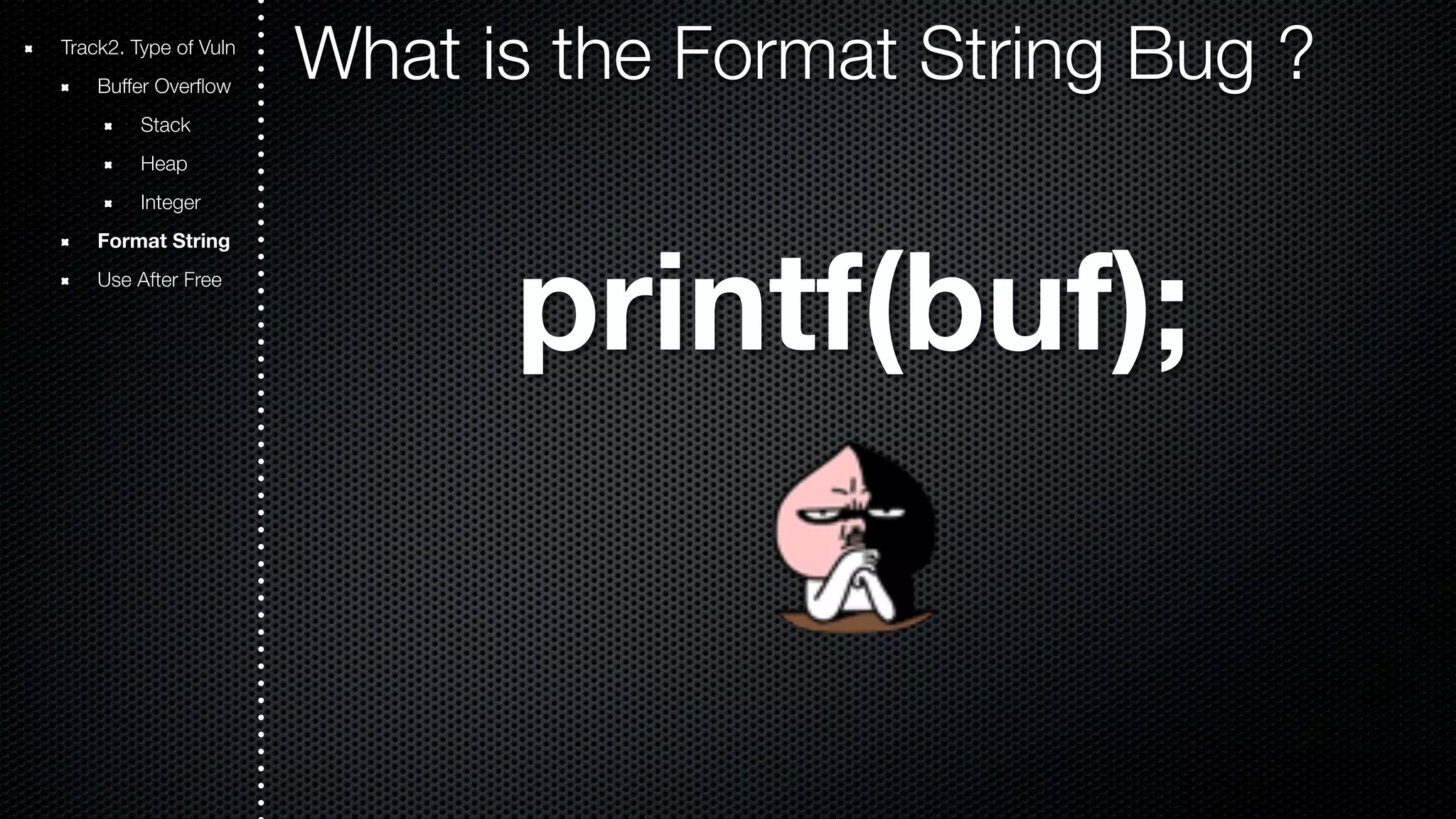
![Track2. Type of Vuln What is the Format String Bug ? Buffer Overflow Stack Heap Integer Format String Use After Free 사용자 입력값으로 포맷스트링이 들어왔을때 발생 (vulnerability occurs when user input data is used as format string) Collect Usage : printf(“%s”, argv[1]); Dangerous Usage : printf(arvg[1]); 임의의 메모리를 읽고 쓰는데 사용할 수 있음 (can be used to read & write arbitrary memory space) 정적 분석 도구를 이용하여 탐지 가능(Can be detected by Static Analysis Tools) But still show up in many competition or software](https://image.slidesharecdn.com/systemhackreversetutorial-introductiontovulnandtypeofvuln-141121001316-conversion-gate01/75/System-Hacking-Tutorial-1-Introduction-to-Vulnerability-and-Type-of-Vulnerability-46-2048.jpg)
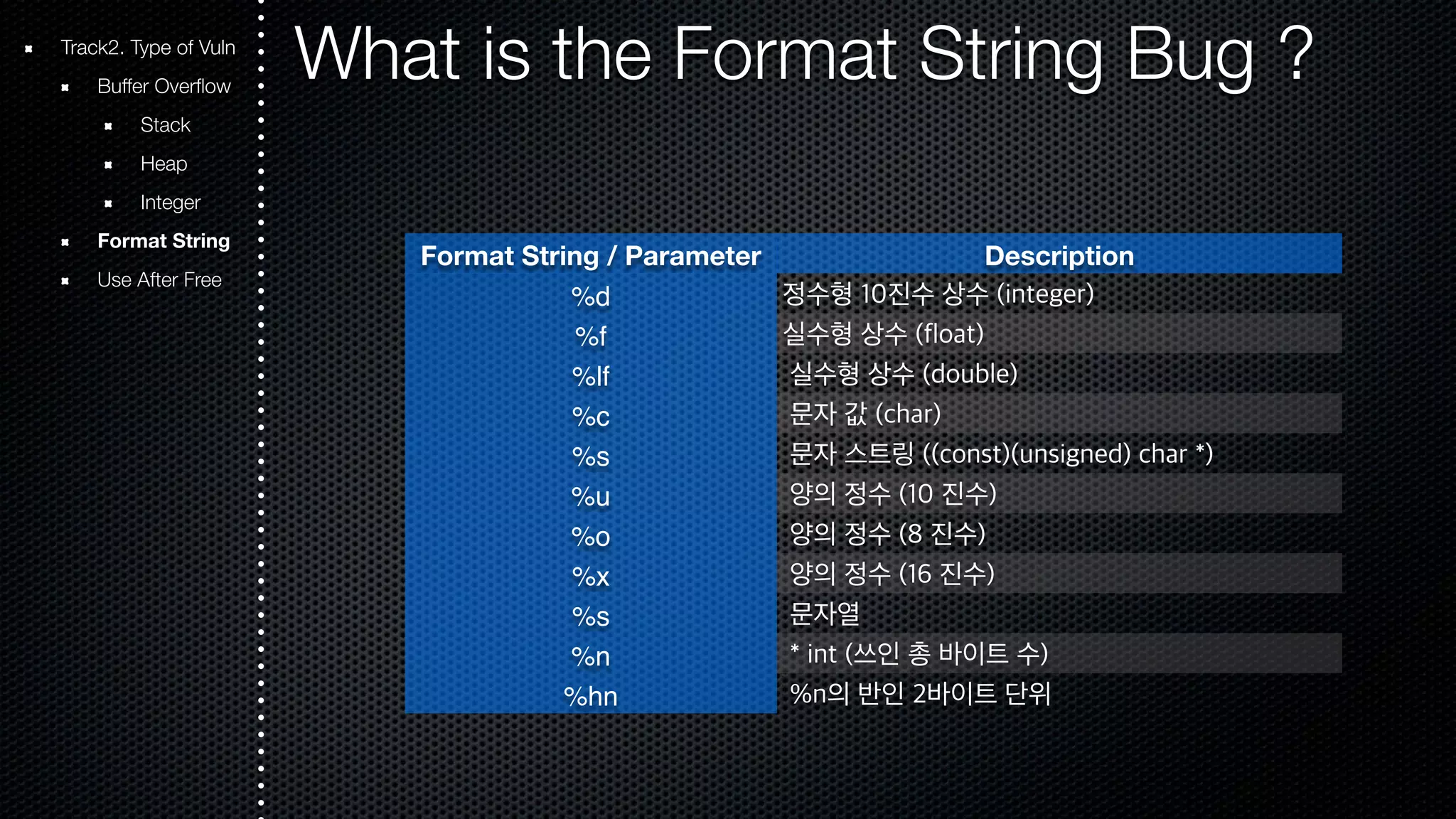
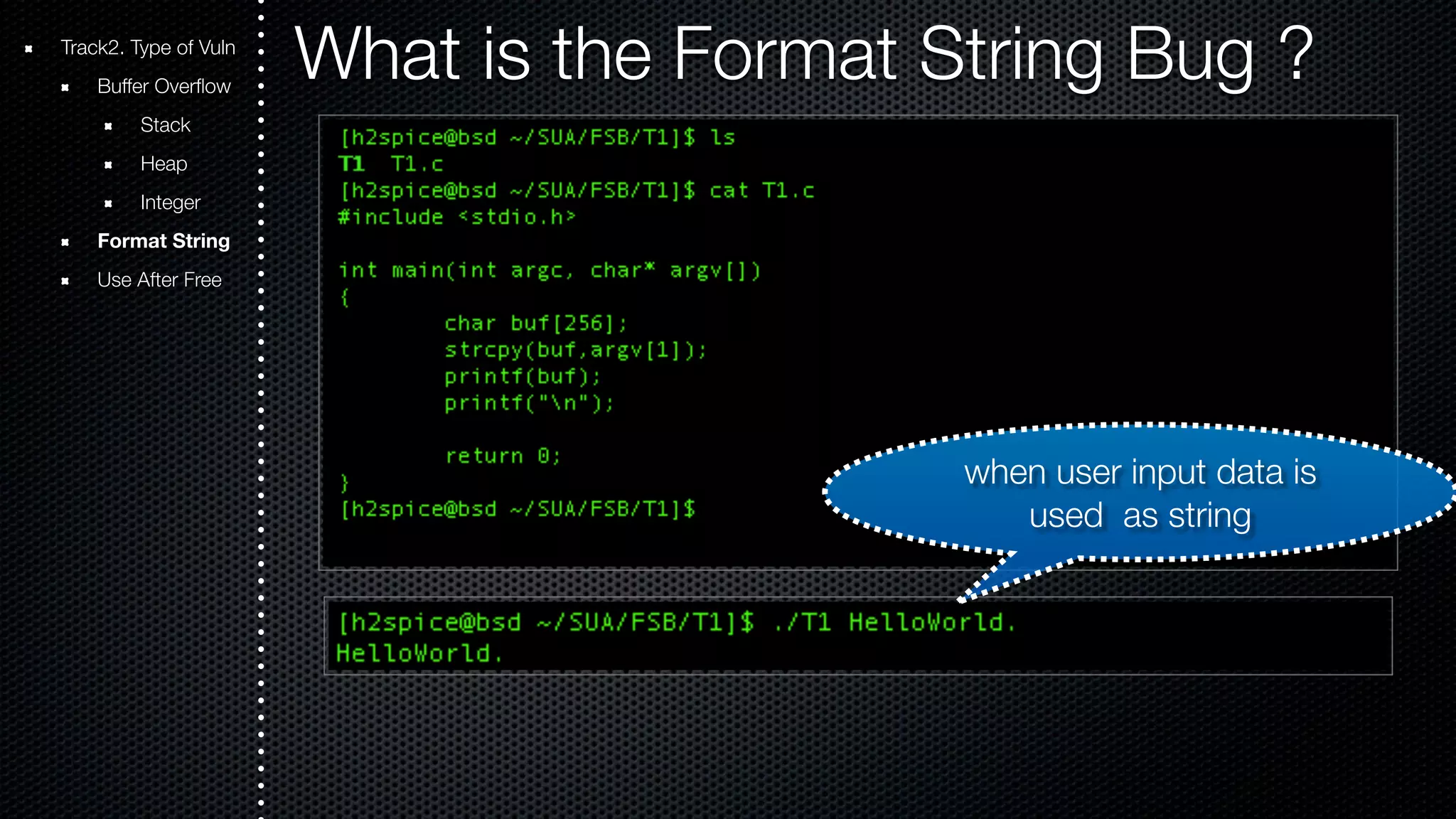
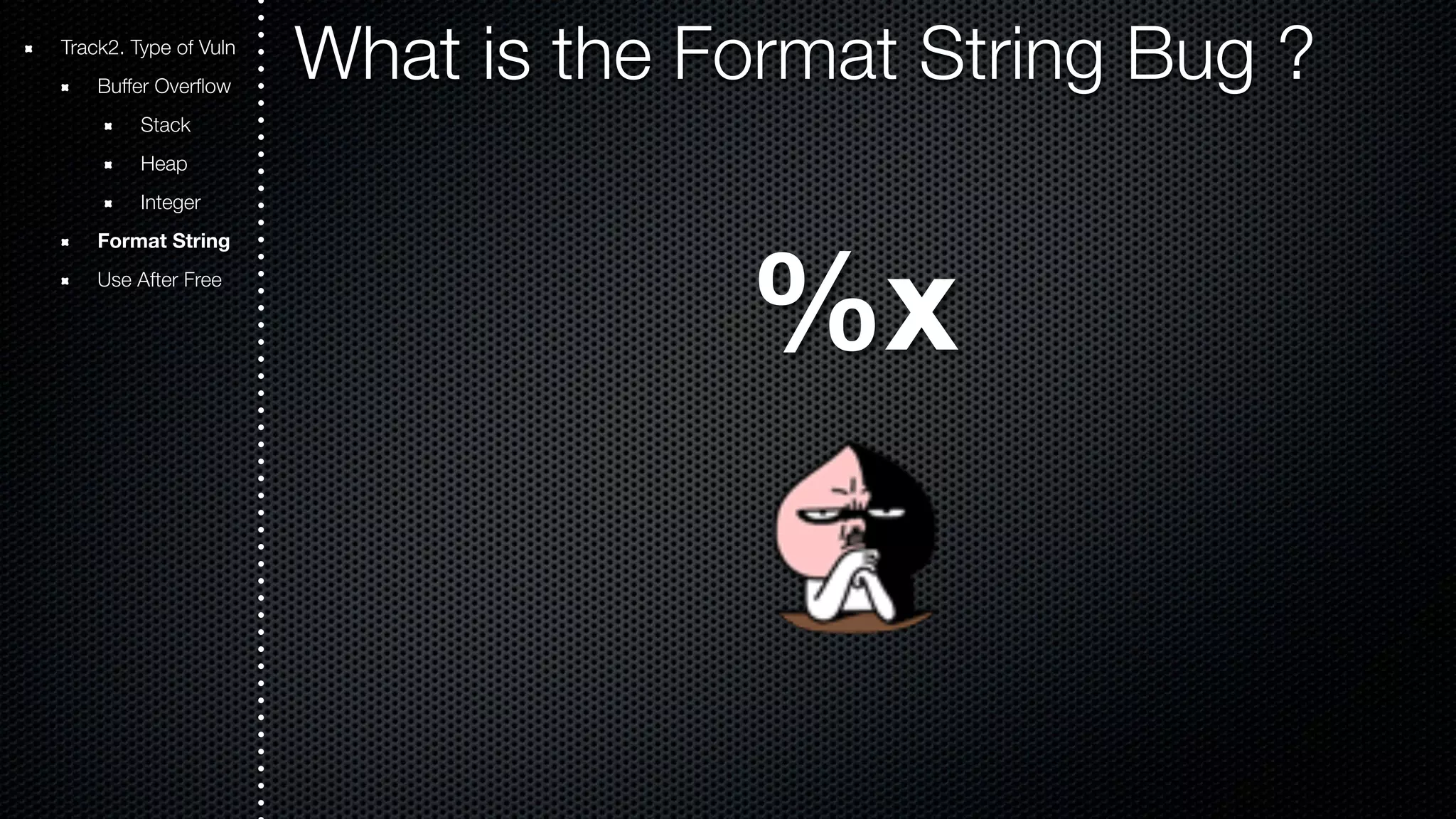
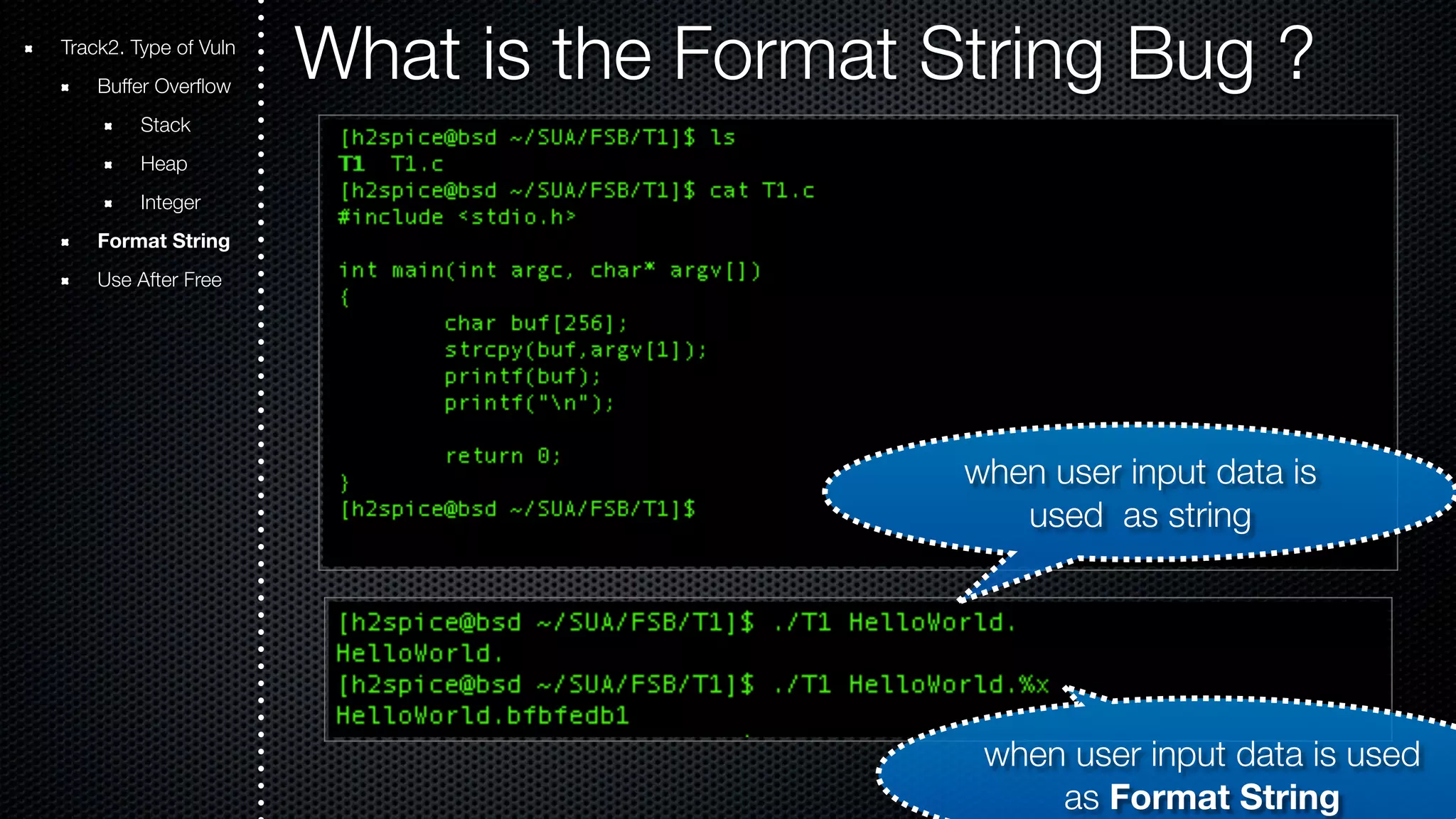
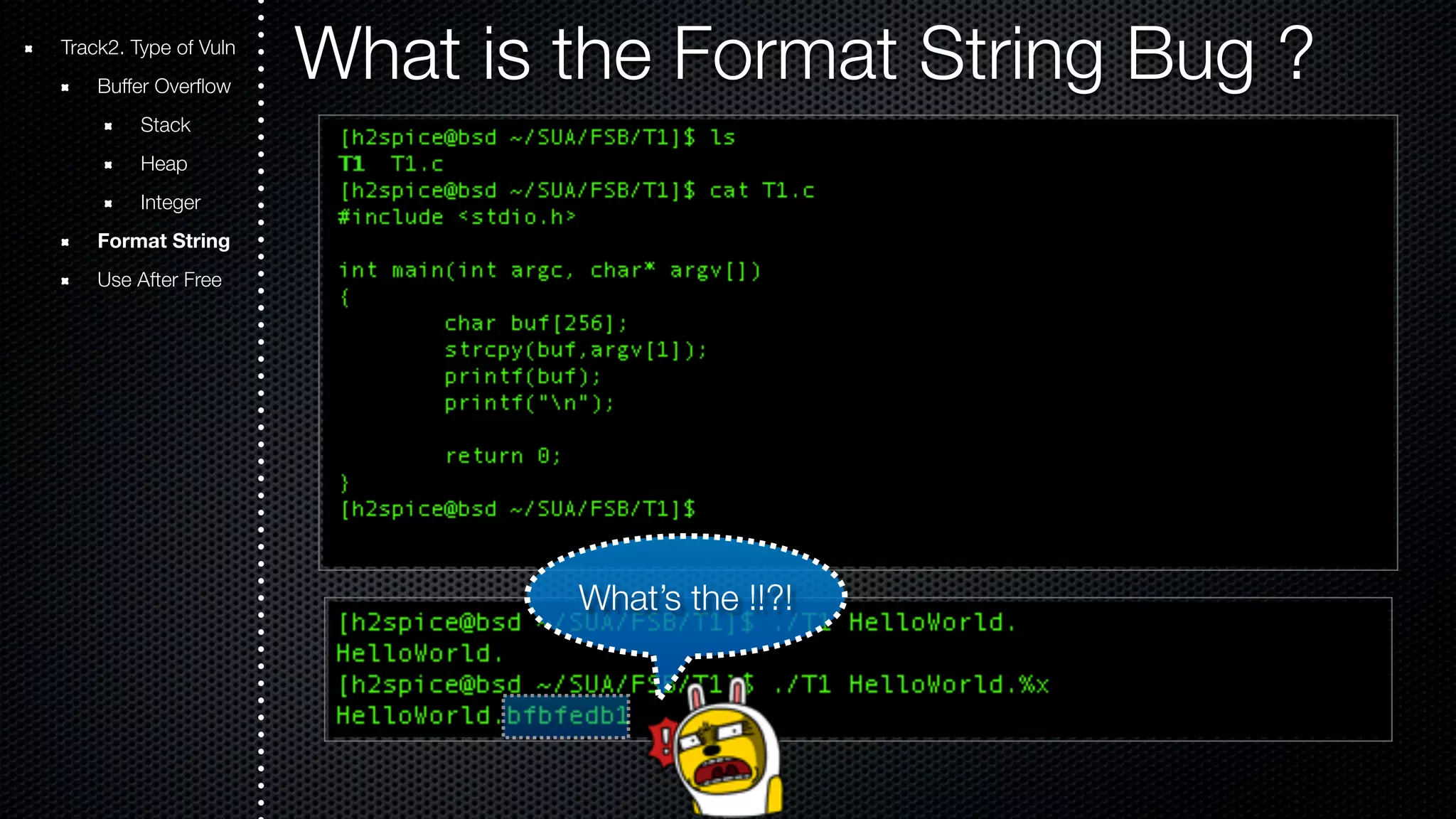
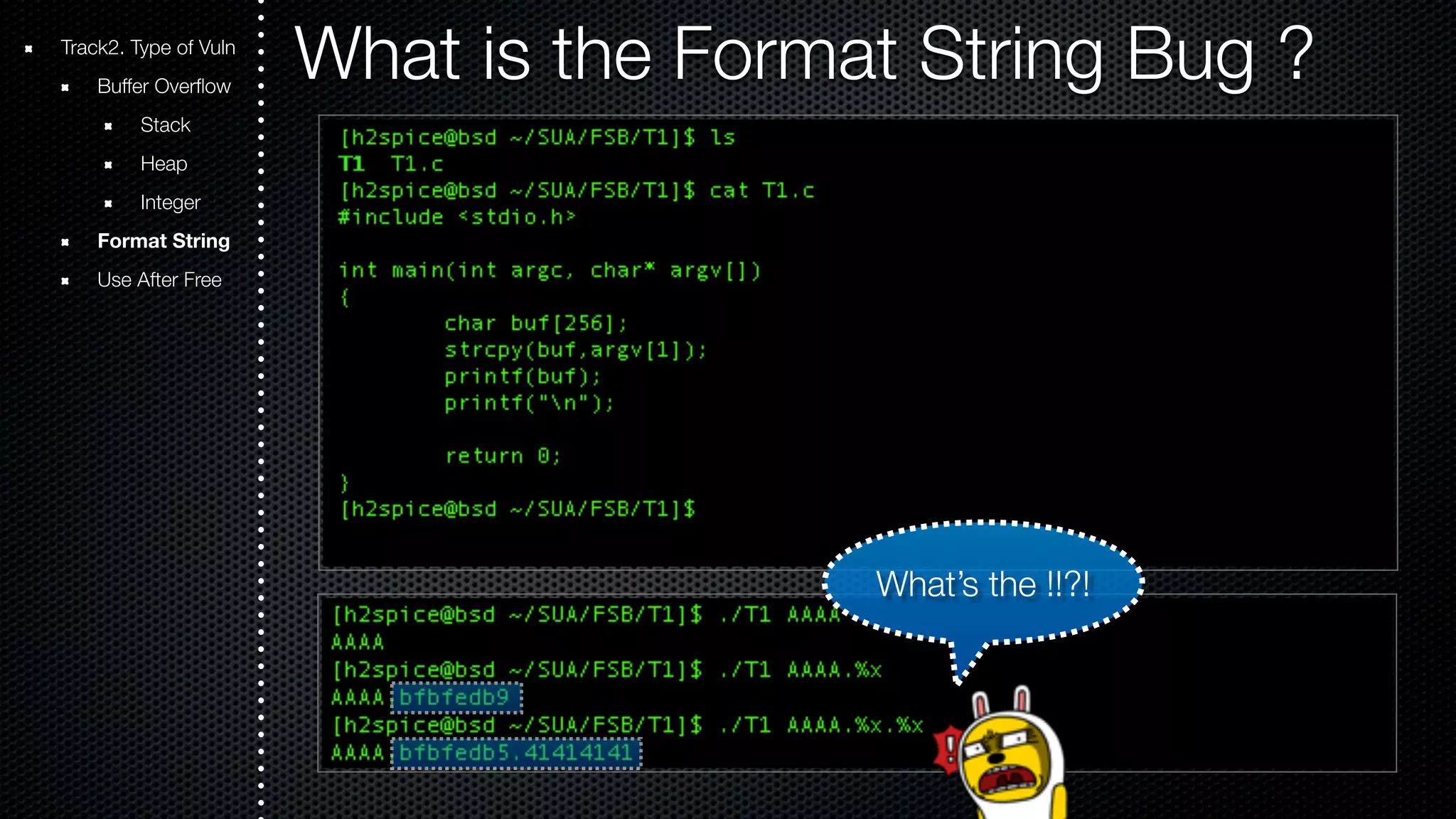
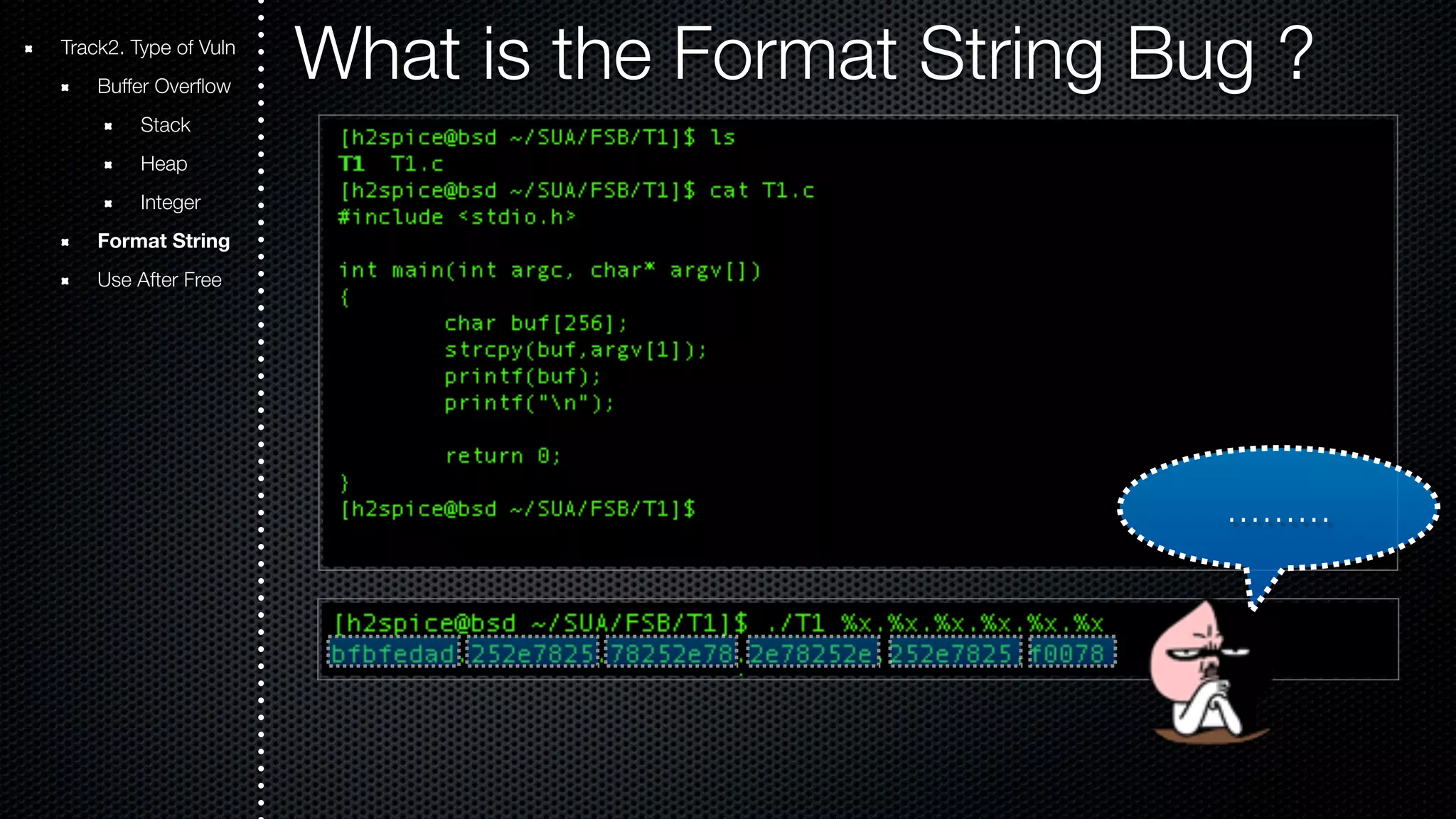
![Track2. Type of Vuln What is the Format String Bug ? Buffer Overflow Stack Heap Integer Format String Use After Free high address buf[256] strcpy printf low address](https://image.slidesharecdn.com/systemhackreversetutorial-introductiontovulnandtypeofvuln-141121001316-conversion-gate01/75/System-Hacking-Tutorial-1-Introduction-to-Vulnerability-and-Type-of-Vulnerability-54-2048.jpg)
![Track2. Type of Vuln What is the Format String Bug ? Buffer Overflow Stack Heap Integer Format String Use After Free high address buf[256] strcpy printf when argument of printf( ) is used as format string “%x” low address ESP](https://image.slidesharecdn.com/systemhackreversetutorial-introductiontovulnandtypeofvuln-141121001316-conversion-gate01/75/System-Hacking-Tutorial-1-Introduction-to-Vulnerability-and-Type-of-Vulnerability-55-2048.jpg)
![Track2. Type of Vuln What is the Format String Bug ? Buffer Overflow Stack Heap Integer Format String Use After Free high address buf[256] strcpy printf low address ESP Hey! where is argument about Format string “%x”](https://image.slidesharecdn.com/systemhackreversetutorial-introductiontovulnandtypeofvuln-141121001316-conversion-gate01/75/System-Hacking-Tutorial-1-Introduction-to-Vulnerability-and-Type-of-Vulnerability-56-2048.jpg)
![Track2. Type of Vuln What is the Format String Bug ? Buffer Overflow Stack Heap Integer Format String Use After Free high address buf[256] strcpy printf low address ESP What happened to this ?](https://image.slidesharecdn.com/systemhackreversetutorial-introductiontovulnandtypeofvuln-141121001316-conversion-gate01/75/System-Hacking-Tutorial-1-Introduction-to-Vulnerability-and-Type-of-Vulnerability-57-2048.jpg)
![Track2. Type of Vuln What is the Format String Bug ? Buffer Overflow Stack Heap Integer Format String Use After Free high address buf[256] strcpy printf low address ESP What happened to this ? we don’t have enough time do as you usually do !](https://image.slidesharecdn.com/systemhackreversetutorial-introductiontovulnandtypeofvuln-141121001316-conversion-gate01/75/System-Hacking-Tutorial-1-Introduction-to-Vulnerability-and-Type-of-Vulnerability-58-2048.jpg)
![Track2. Type of Vuln What is the Format String Bug ? Buffer Overflow Stack Heap Integer Format String Use After Free high address buf[256] strcpy printf low address ESP](https://image.slidesharecdn.com/systemhackreversetutorial-introductiontovulnandtypeofvuln-141121001316-conversion-gate01/75/System-Hacking-Tutorial-1-Introduction-to-Vulnerability-and-Type-of-Vulnerability-59-2048.jpg)
![Track2. Type of Vuln What is the Format String Bug ? Buffer Overflow Stack Heap Integer Format String Use After Free high address buf[256] strcpy printf ESP printf( ) 호출시 인자값 인자들은 스택에 적재되 low address 는데, printf(%x) 실행시 esp는 printf( )에 들어갈 인자값을 가르키고 있을 것입니다. 하지만 %x에 맞는 인자가 없을 경우, 컴 퓨터는 그냥 esp+4 지점의 값, strcpy의 인자값중 하나를 16진수로 출력해버리게됩니다.](https://image.slidesharecdn.com/systemhackreversetutorial-introductiontovulnandtypeofvuln-141121001316-conversion-gate01/75/System-Hacking-Tutorial-1-Introduction-to-Vulnerability-and-Type-of-Vulnerability-60-2048.jpg)
![Track2. Type of Vuln What is the Format String Bug ? Buffer Overflow Stack Heap Integer Format String Use After Free high address buf[256] strcpy printf low address ESP+4 printf( ) 호출시 인자값 인자들은 스택에 적재되 는데, printf(%x) 실행시 esp는 printf( )에 들어갈 인자값을 가르키고 있을 것입니다. 하지만 %x에 맞는 인자가 없을 경우, 컴 퓨터는 그냥 esp+4 지점의 값, strcpy의 인자값중 하나를 16진수로 출력해버리게됩니다.](https://image.slidesharecdn.com/systemhackreversetutorial-introductiontovulnandtypeofvuln-141121001316-conversion-gate01/75/System-Hacking-Tutorial-1-Introduction-to-Vulnerability-and-Type-of-Vulnerability-61-2048.jpg)
![Track2. Type of Vuln What is the Format String Bug ? Buffer Overflow Stack Heap Integer Format String Use After Free high address buf[256] strcpy printf low address ESP+16 ESP+12 ESP+8 ESP+4](https://image.slidesharecdn.com/systemhackreversetutorial-introductiontovulnandtypeofvuln-141121001316-conversion-gate01/75/System-Hacking-Tutorial-1-Introduction-to-Vulnerability-and-Type-of-Vulnerability-62-2048.jpg)
![Track2. Type of Vuln What is the Format String Bug ? Buffer Overflow Stack Heap Integer Format String Use After Free high address buf[256] strcpy printf low address ESP+4 Point1. We can read the arbitrary memory space](https://image.slidesharecdn.com/systemhackreversetutorial-introductiontovulnandtypeofvuln-141121001316-conversion-gate01/75/System-Hacking-Tutorial-1-Introduction-to-Vulnerability-and-Type-of-Vulnerability-63-2048.jpg)
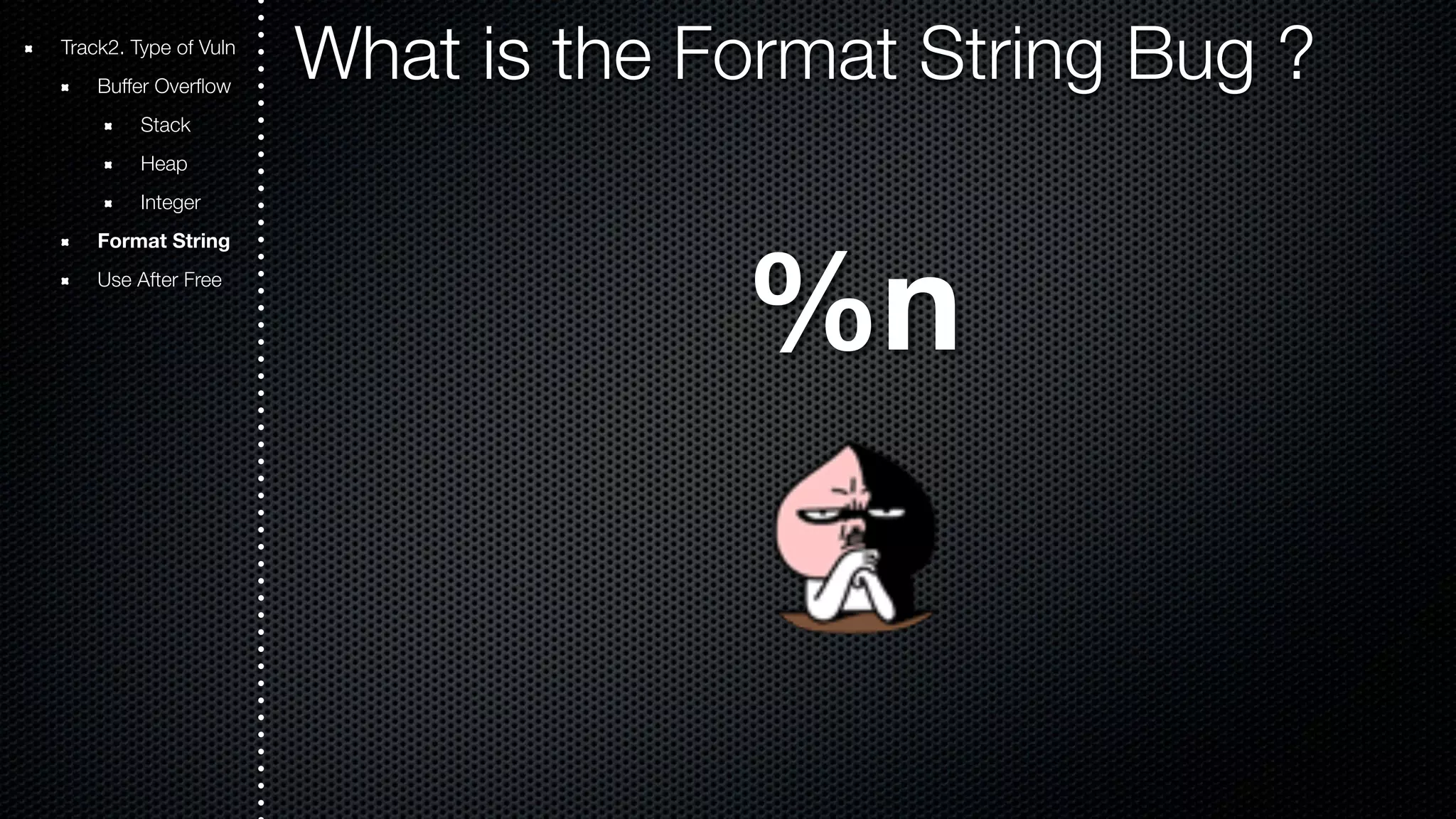
![Track2. Type of Vuln What is the Format String Bug ? Buffer Overflow Stack Heap Integer Format String Use After Free high address buf[256] strcpy printf when argument of printf( ) is used as format string “%n” low address ESP](https://image.slidesharecdn.com/systemhackreversetutorial-introductiontovulnandtypeofvuln-141121001316-conversion-gate01/75/System-Hacking-Tutorial-1-Introduction-to-Vulnerability-and-Type-of-Vulnerability-65-2048.jpg)
![Track2. Type of Vuln What is the Format String Bug ? Buffer Overflow Stack Heap Integer Format String Use After Free high address buf[256] strcpy printf low address ESP ………](https://image.slidesharecdn.com/systemhackreversetutorial-introductiontovulnandtypeofvuln-141121001316-conversion-gate01/75/System-Hacking-Tutorial-1-Introduction-to-Vulnerability-and-Type-of-Vulnerability-66-2048.jpg)
![Track2. Type of Vuln What is the Format String Bug ? Buffer Overflow Stack Heap Integer Format String Use After Free high address buf[256] strcpy printf low address ESP What’s the !!?!](https://image.slidesharecdn.com/systemhackreversetutorial-introductiontovulnandtypeofvuln-141121001316-conversion-gate01/75/System-Hacking-Tutorial-1-Introduction-to-Vulnerability-and-Type-of-Vulnerability-67-2048.jpg)
![Track2. Type of Vuln What is the Format String Bug ? Buffer Overflow Stack Heap Integer Format String Use After Free high address buf[256] strcpy printf low address ESP What’s the !!?! %n은 두가지 동작을 하는데 한가지는 지금까지 출력된 자리수를 구하고, 두번째는 다음 스택의 내용을 주소로 인식하여 해당 주소에 방금 계산한 값을 기록합니다.(%n writes the number of bytes printed so far to the target address)](https://image.slidesharecdn.com/systemhackreversetutorial-introductiontovulnandtypeofvuln-141121001316-conversion-gate01/75/System-Hacking-Tutorial-1-Introduction-to-Vulnerability-and-Type-of-Vulnerability-68-2048.jpg)
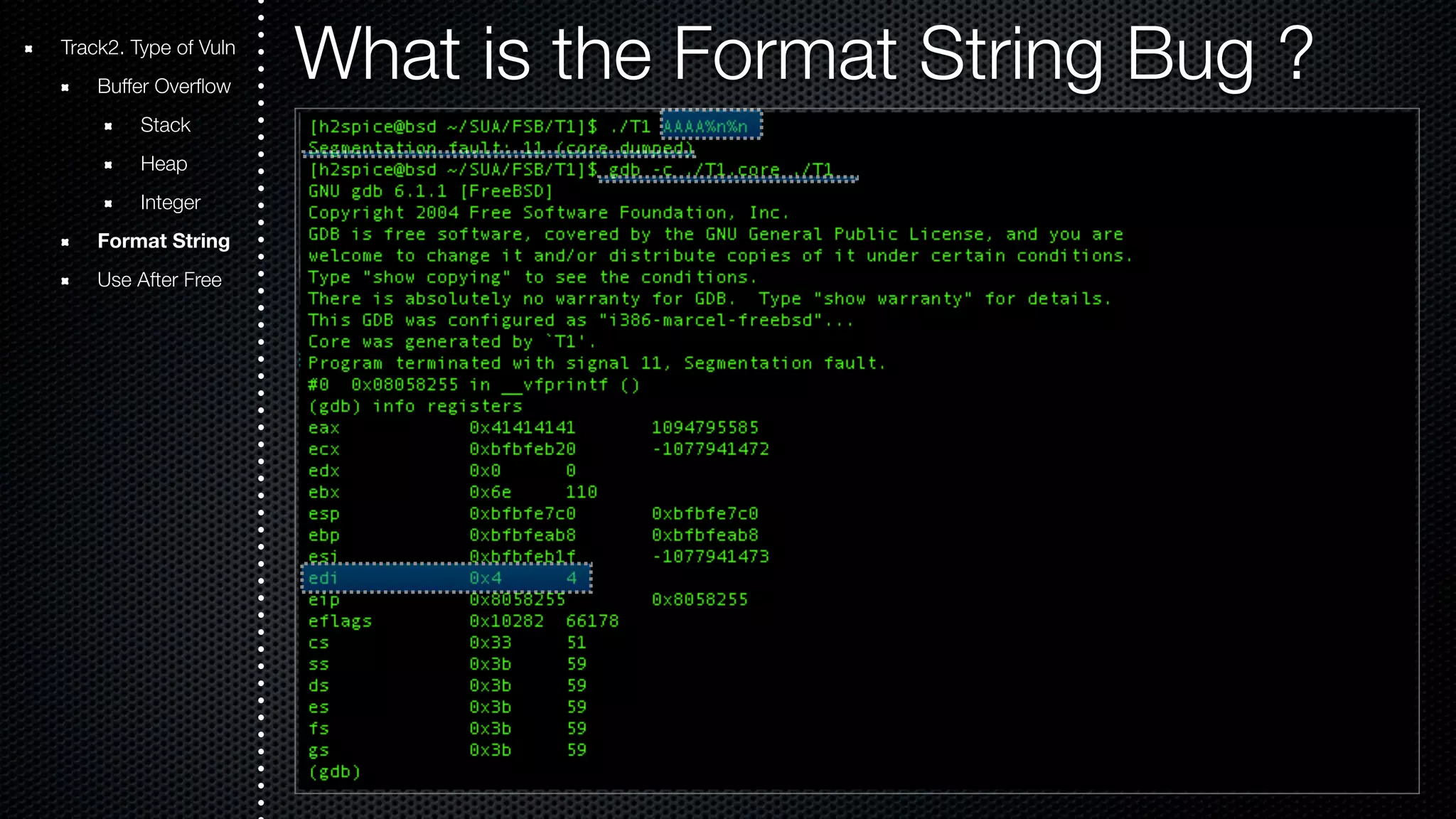
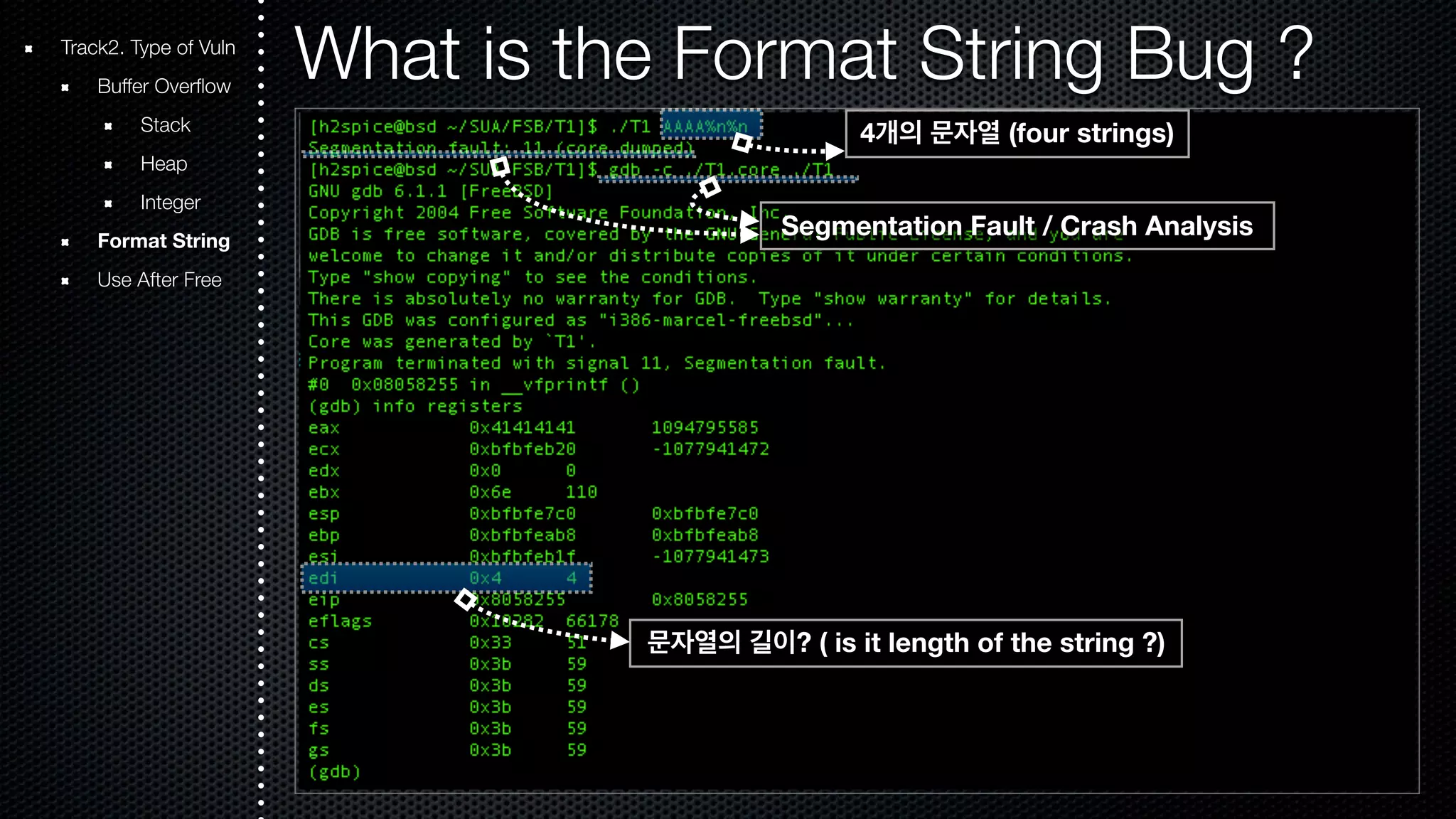
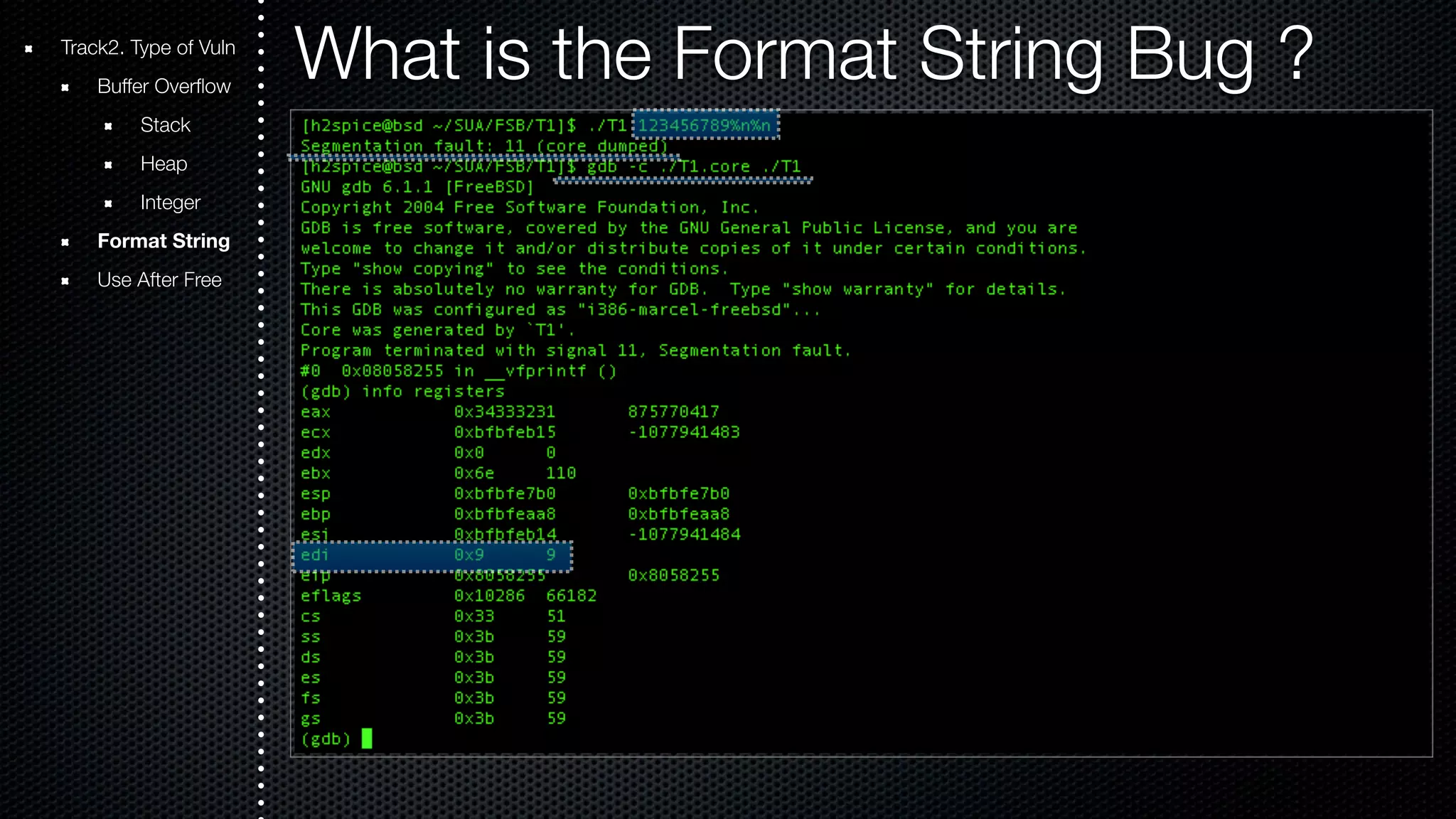
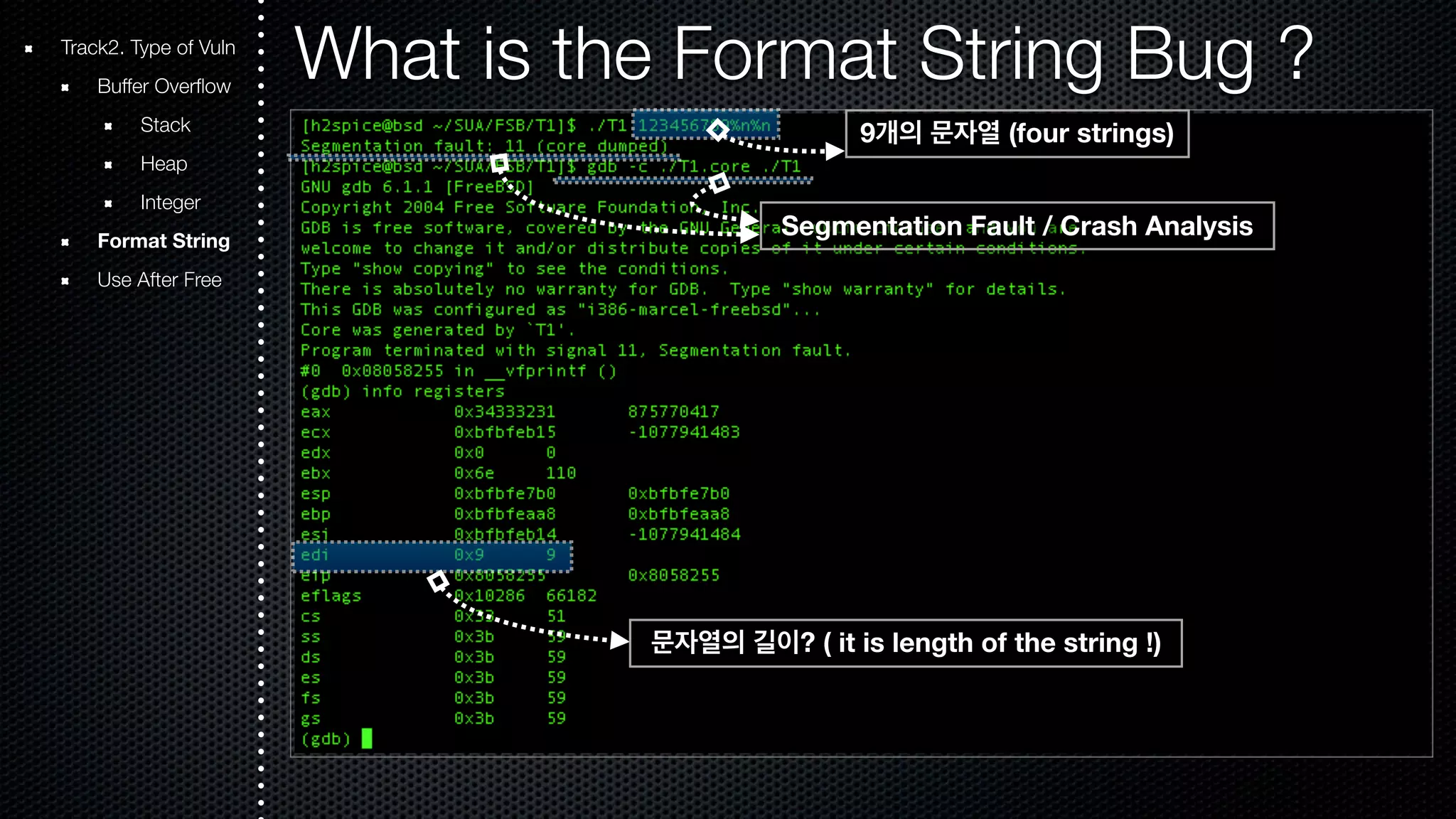
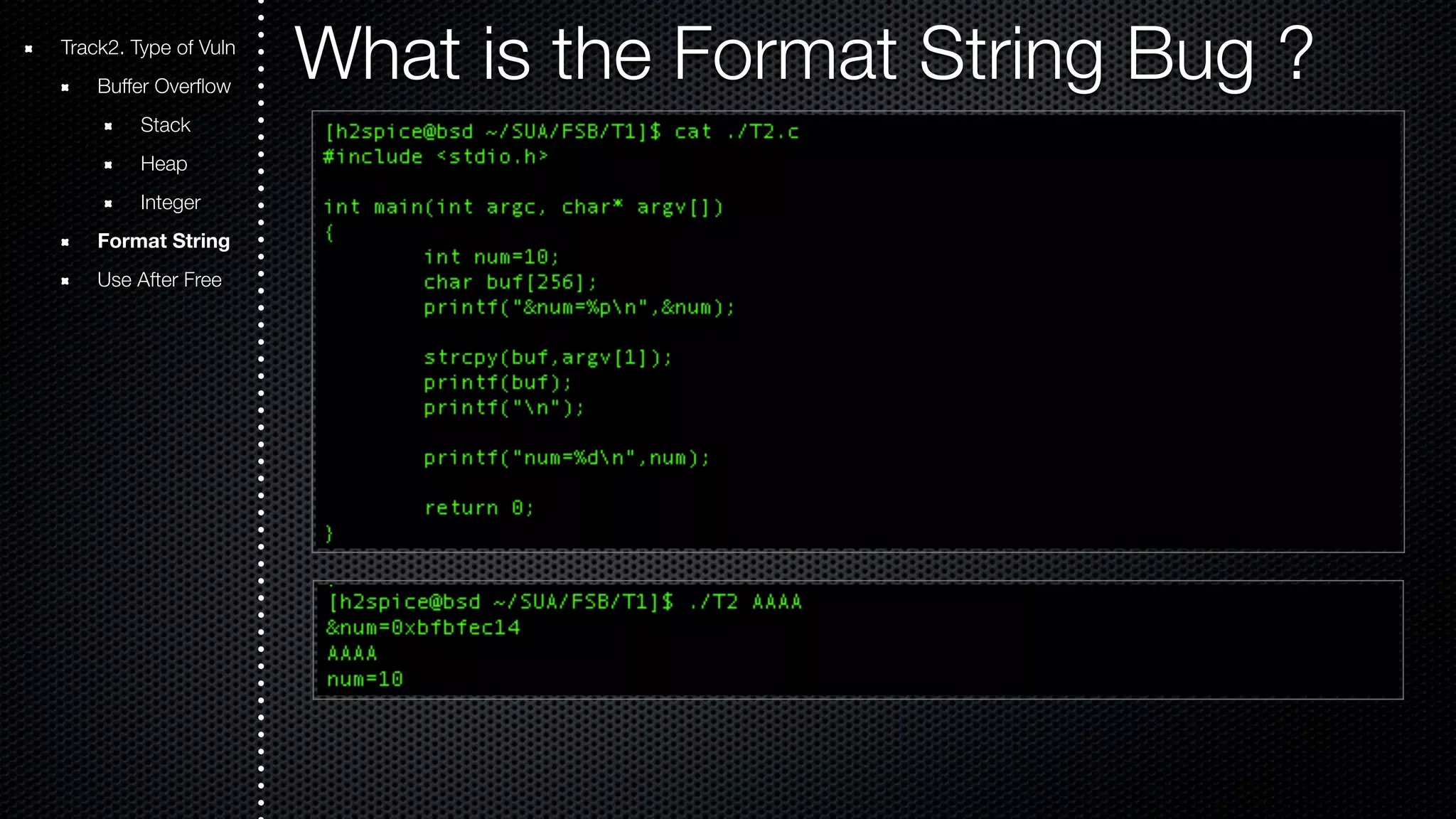
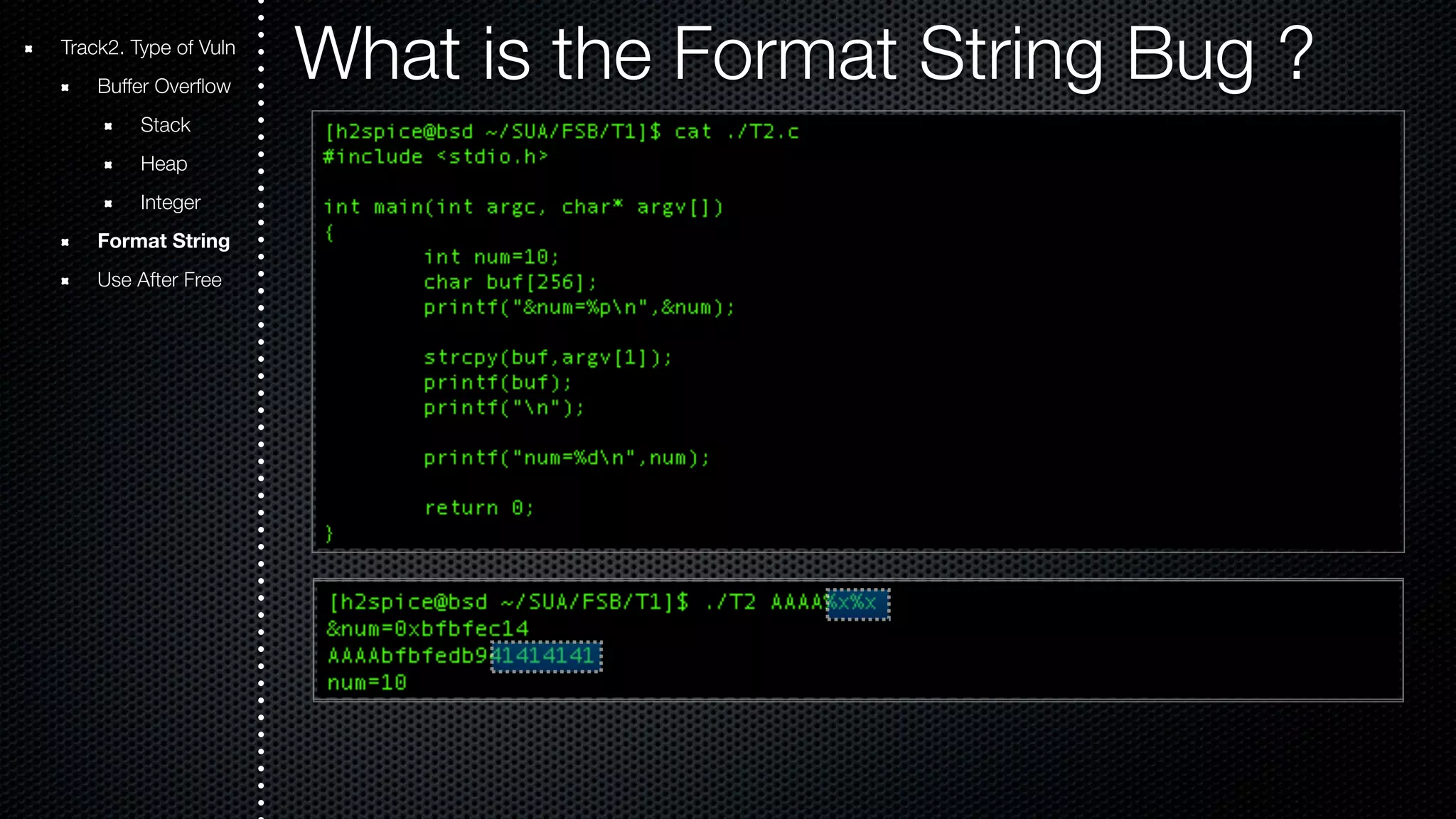
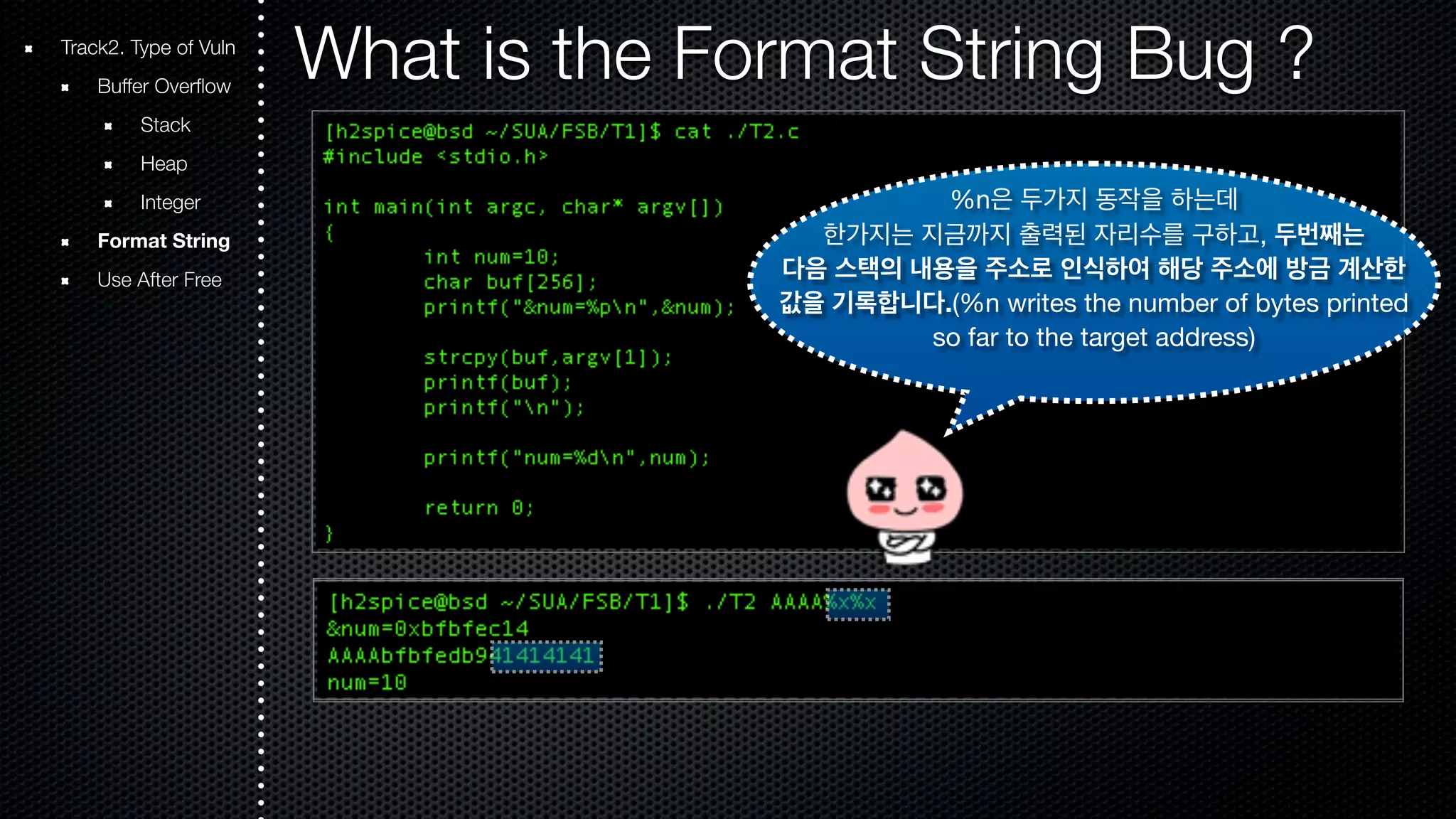
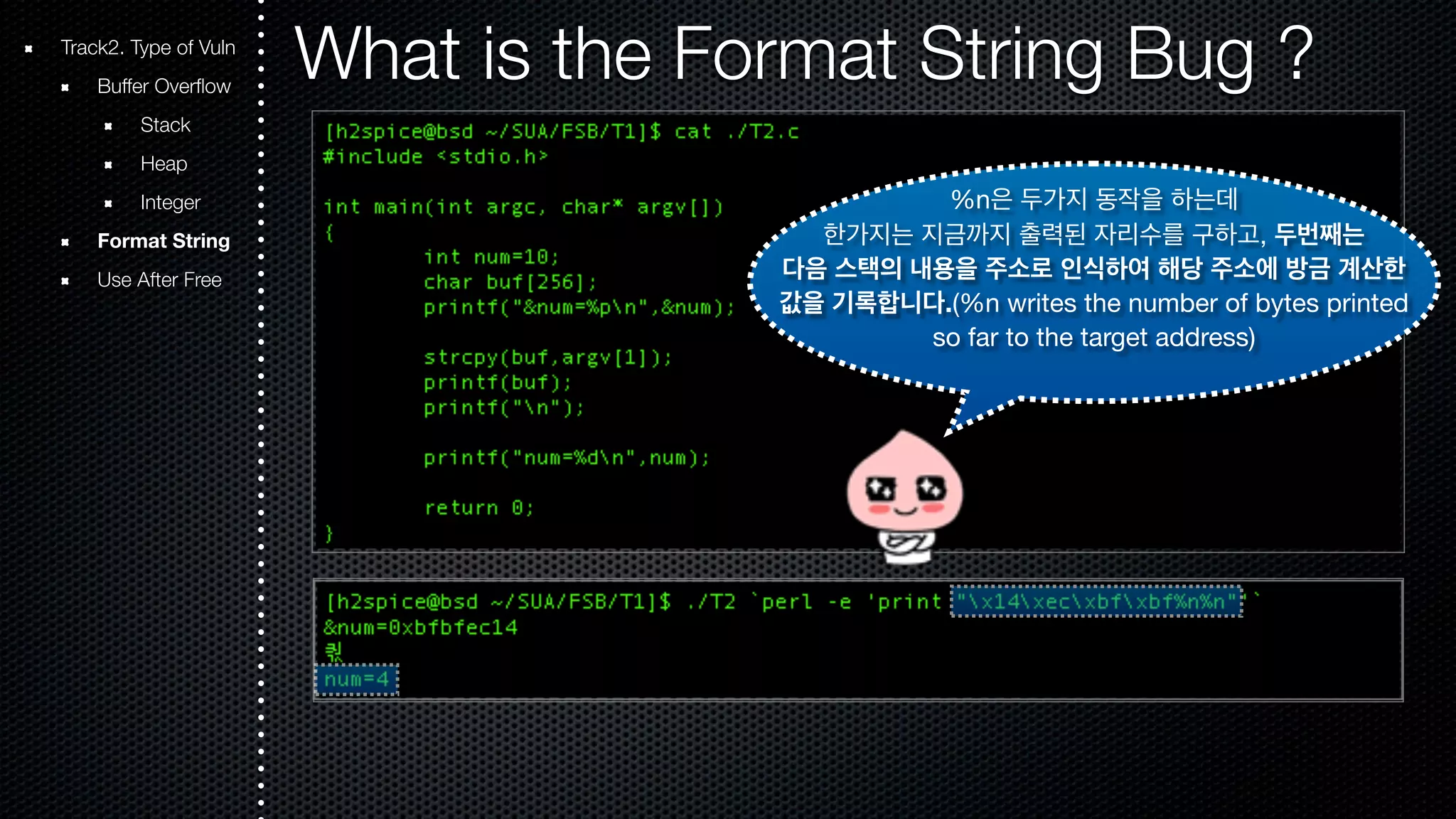
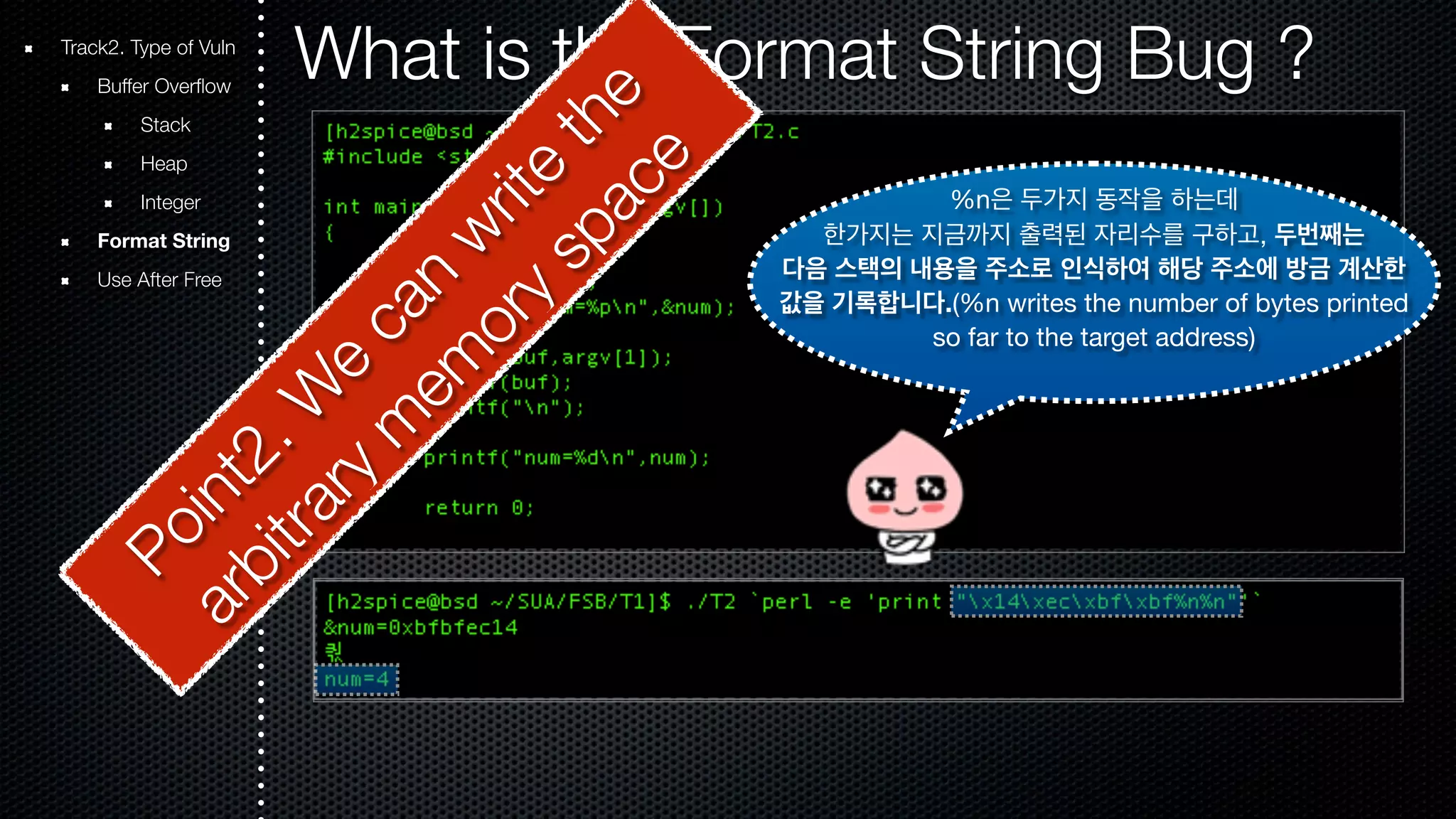

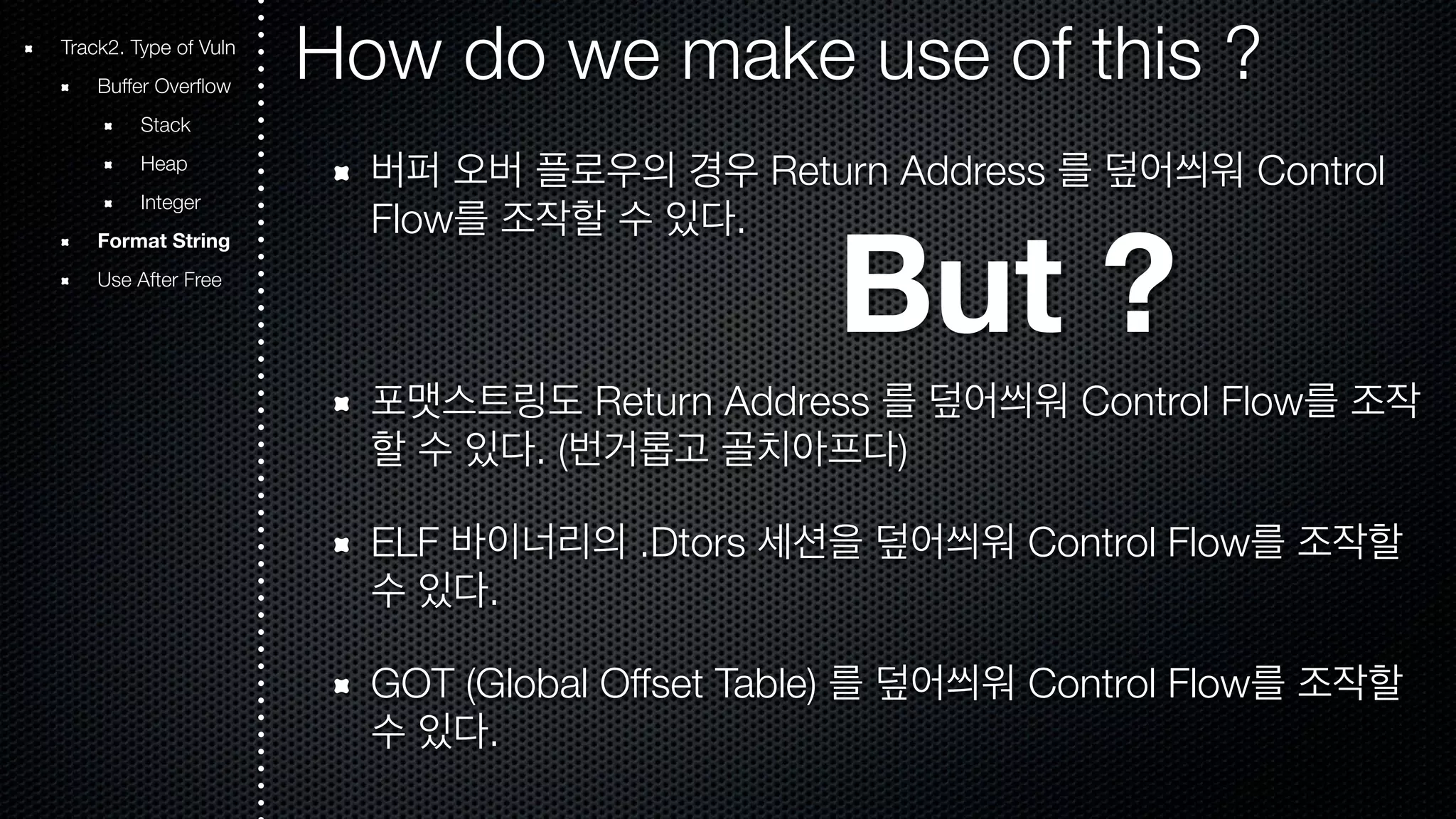
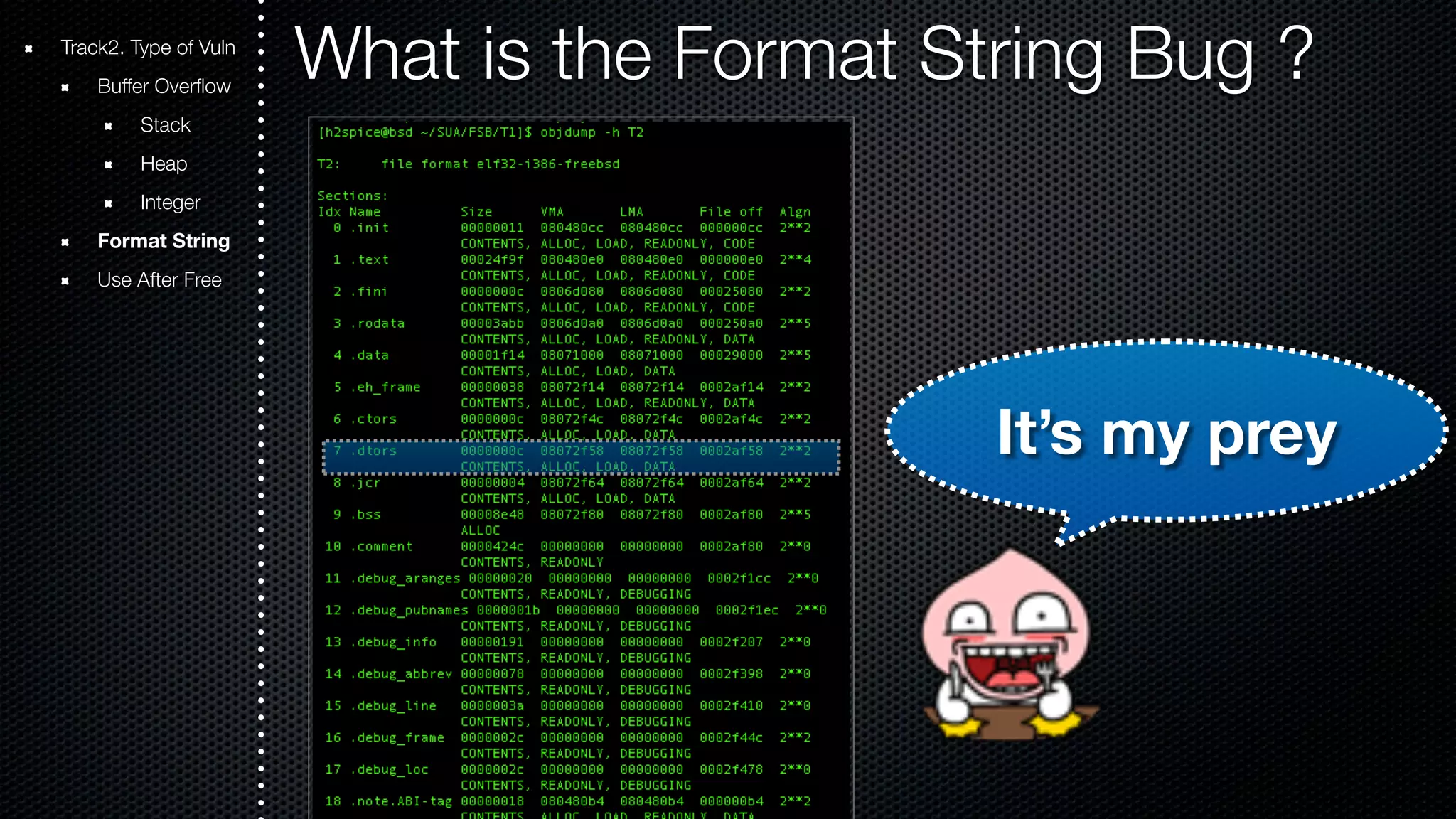
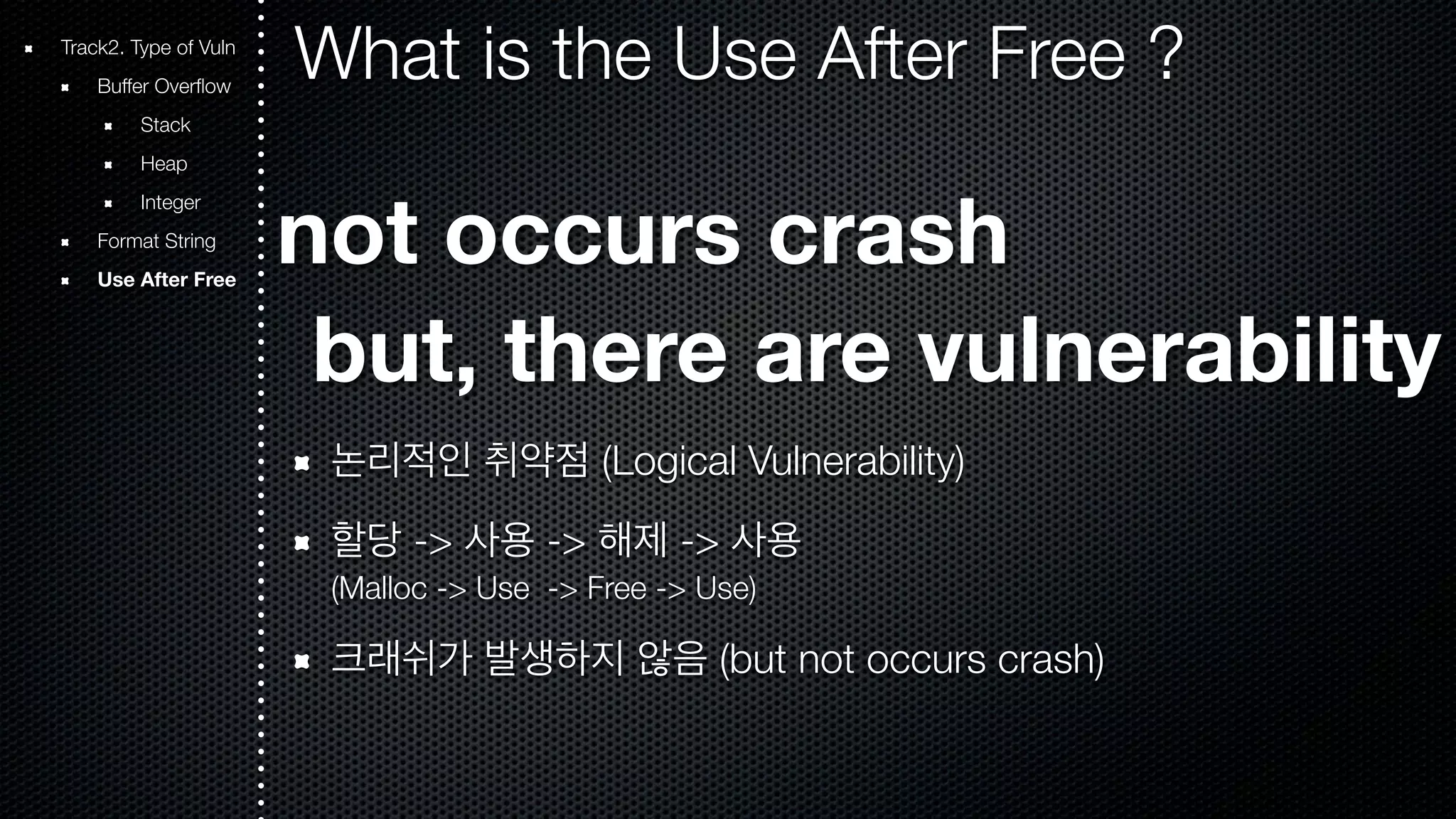
![Proof of Concept about Use After Free #include <stdio.h> #define MAX 512 int main(int argc, char* argv[]) { char* buf1A; char* buf2A; char* buf3A; char* data = "hello world"; buf1A = (char*) malloc(MAX); buf2A = (char*) malloc(MAX); strncpy(buf1A, data, MAX-1); printf("[+]user input data = %s n",argv[1]); printf("[+]data of buf1A = %sn",buf1A); free(buf1A); printf("[+]free buf1An"); strncpy(buf1A, argv[1], MAX-1); printf("[+]copy user input data to buf1An"); printf("[+]after free, data of buf1A = %s n", buf1A); } Output : h2spice@ubuntu:~/Desktop/useafterfree $ ./useafterfreePoc use-after-free [+]user input data = use-after-free [+]data of buf1A = hello world [+]free buf1A [+]copy user input data to buf1A [+]after free, data of buf1A = use-after-free](https://image.slidesharecdn.com/systemhackreversetutorial-introductiontovulnandtypeofvuln-141121001316-conversion-gate01/75/System-Hacking-Tutorial-1-Introduction-to-Vulnerability-and-Type-of-Vulnerability-82-2048.jpg)
![Proof of Concept about Use After Free #include <stdio.h> #define MAX 512 int main(int argc, char* argv[]) { char* buf1A; char* buf2A; char* buf3A; char* data = "hello world"; buf1A = (char*) malloc(MAX); buf2A = (char*) malloc(MAX); strncpy(buf1A, data, MAX-1); printf("[+]user input data = %s n",argv[1]); printf("[+]data of buf1A = %sn",buf1A); free(buf1A); printf("[+]free buf1An"); strncpy(buf1A, argv[1], MAX-1); printf("[+]copy user input data to buf1An"); printf("[+]after free, data of buf1A = %s n", buf1A); } Output : h2spice@ubuntu:~/Desktop/useafterfree $ ./useafterfreePoc use-after-free [+]user input data = use-after-free [+]data of buf1A = hello world [+]free buf1A [+]copy user input data to buf1A [+]after free, data of buf1A = use-after-free](https://image.slidesharecdn.com/systemhackreversetutorial-introductiontovulnandtypeofvuln-141121001316-conversion-gate01/75/System-Hacking-Tutorial-1-Introduction-to-Vulnerability-and-Type-of-Vulnerability-83-2048.jpg)
![Proof of Concept about Use After Free #include <stdio.h> #define MAX 512 int main(int argc, char* argv[]) { char* buf1A; char* buf2A; char* buf3A; char* data = "hello world"; buf1A = (char*) malloc(MAX); buf2A = (char*) malloc(MAX); strncpy(buf1A, data, MAX-1); printf("[+]user input data = %s n",argv[1]); printf("[+]data of buf1A = %sn",buf1A); free(buf1A); printf("[+]free buf1An"); strncpy(buf1A, argv[1], MAX-1); printf("[+]copy user input data to buf1An"); printf("[+]after free, data of buf1A = %s n", buf1A); } Output : h2spice@ubuntu:~/Desktop/useafterfree $ ./useafterfreePoc use-after-free [+]user input data = use-after-free [+]data of buf1A = hello world [+]free buf1A [+]copy user input data to buf1A [+]after free, data of buf1A = use-after-free](https://image.slidesharecdn.com/systemhackreversetutorial-introductiontovulnandtypeofvuln-141121001316-conversion-gate01/75/System-Hacking-Tutorial-1-Introduction-to-Vulnerability-and-Type-of-Vulnerability-84-2048.jpg)
![Proof of Concept about Use After Free #include <stdio.h> #define MAX 512 int main(int argc, char* argv[]) { char* buf1A; char* buf2A; char* buf3A; char* data = "hello world"; buf1A = (char*) malloc(MAX); buf2A = (char*) malloc(MAX); strncpy(buf1A, data, MAX-1); printf("[+]user input data = %s n",argv[1]); printf("[+]data of buf1A = %sn",buf1A); free(buf1A); printf("[+]free buf1An"); strncpy(buf1A, argv[1], MAX-1); printf("[+]copy user input data to buf1An"); printf("[+]after free, data of buf1A = %s n", buf1A); } Output : h2spice@ubuntu:~/Desktop/useafterfree $ ./useafterfreePoc use-after-free [+]user input data = use-after-free [+]data of buf1A = hello world [+]free buf1A [+]copy user input data to buf1A [+]after free, data of buf1A = use-after-free](https://image.slidesharecdn.com/systemhackreversetutorial-introductiontovulnandtypeofvuln-141121001316-conversion-gate01/75/System-Hacking-Tutorial-1-Introduction-to-Vulnerability-and-Type-of-Vulnerability-85-2048.jpg)
![What is Exploitable Crash ? mov eax,dword ptr [esi+0Ch] mov eax,dword ptr [ecx] mov edx,dword ptr [eax+5Ch] call edx](https://image.slidesharecdn.com/systemhackreversetutorial-introductiontovulnandtypeofvuln-141121001316-conversion-gate01/75/System-Hacking-Tutorial-1-Introduction-to-Vulnerability-and-Type-of-Vulnerability-86-2048.jpg)
